#and also me just trying to draw my own characters for the sake of having them on paper
Text

super disorganized sketch page because i do what i want
#my art#not sure if i wanna tag these... hrm#i wonder if alt text shows up in search results.... shudders#well anyway. i wanna ramble about these!!#for willy mafton: i've been working on designing more of the human cast. mainly all the big name important ones#it's been a slow process + a little challenging but i like getting the chance to practice drawing faces! :]#in regards to His design specifically.. it's very much based off of his movie apperance#but with a reference to that Classic sprite thrown in#bc i thought making him a little cartoony and inhuman would fit him :] but idk im not an expert on his character or anything#about the rabbit lady: i forgot how i had that idea initially but it ended up looking so fucking cool tbh#im always a fan of making her design less of a feminine eye candy type of design and more of a Spooky Murderer type >:3c#it also gave me the idea to try making some similar designs for the glams...#but if i do that im not gonna be giving them that vintage rubber mask look... since they're meant to be super flashy and high tech looking#so i was thinking they could have faces with more of a silicone texture.. and that have a style based more off of their in game art work :]#so they'd be like giant dolls with weird moving faces rather than having a vintage animatronic look#also that van in the bottom middle is 100% a homage to a specific user i wont be mentioning but iykyk HFJZJFJF#ANYWAY the 🌞🌜 stuff: dont be weird about it please HFJZJG#im aware that these tags are very easy to ignore but like. genuinely pls dont be weird about them#dont romanticize it. its not meant to be ''y/ndere'' or anything like that#its actually a bit personal to me so like... interpret it as you like but be aware its not meant to be a happy or positive thing#anyway i think thats all i have to say... i've been trying to branch out a tiny bit regarding the things i draw#it's always nice to challenge yourself even if its tough... especially if its tough!!#i mainly draw just for my own sake but i hope ppl see something they like here#these tags got so fucking long oops... i'll stop now JFKZJFKSJGKSJG
100 notes
·
View notes
Text
who up seeing their disorder in a fictional character but feel like its not their place to put a name on it
#id have to be waterboarded before i can talk abt how i see a lot of my adhd and personality in mitsumi iwakura let alone post it#idk how to talk abt this without feeling like im talking over or invalidating ppls experiences relating with a character#someone was talking abt how ppl tie laios' autism to special interest and social difficulties but not much else which kinda flattens it#and then went into a respectful in depth analysis of other autistic behaviour that laios exhibits and it wasnt phrased meanly#its fascinating and important to me to hear someone explain a little bit abt traits that they recognized and often go overlooked#because it does help me learn more about it. but i think thats also where hesitancy kicks in when it comes to depicting it accurately#like i have adhd and some of my adhd symptoms overlap with autism (time blindness and pattern seeking behaviour) but that only means#it feels familiar to me even without having autism. on top of that traits arent always cleanly determined as being /caused/ by#a disorder. to understand my environment i compare it to something unrelated but similar to make it more familiar and for the longest time#i thought that was a personality thing and not an information processing thing since i loved playing pretend in my head as a kid#so if you make a character who experiences that hoping to reach people that also experience that and tell them its not weird or#smth youre making up like. thats the goal. ppl who dont get it arent expected to it just means it doesnt cater to them but it helps them#become familiar to it yk? since i dont have autism myself i dont feel confident i can depict it properly or explain it in my own words#but that doesnt mean im trying to dismiss it or try and cut it out completely.. ill just leave the floor open to someone who /can/#a lot of issues around fanon depictions are when smth is baselessly popularized or a characters personality and behavior is flattened#especially to fit them into a trending meme. its harmless and its supposed to be for fun but it gets tricky when you drag things that#need to be carefully explained beforehand or else it gets lost in translation. like that tweet abt 'hyperfixating' on cooking pasta#once it becomes popular language usually the original meaning is left out for the sake of simplifying it for everyone that when it#circles back theres a sort of hesitancy like. am i using it the way it was intended or am i unknowingly using the popularized version of it#actually thats probably why i felt wrongfooted during diagnosis bc it felt like i was misusing the words i heard to describe what i felt#i /know/ i see a lot of myself in mitsumi because our minds are always somewhere else and we tend to put good faith first and for me#that personal connection is enough. but idk it feels like its always gonna have to be 'palatable' first before i can talk abt it openly#mad respect to writers and creators who stick to their story even if theres the looming fear of ppl misinterpreting it and letting them#have it.. its been almost 2 weeks and i am so close to deleting that m3 dunmeshi drawing bc ppl keep saying chilchuck wouldnt have 200 HP#IT LITERALLY SAYS I MADE IT WHILE WATCHING EP 1. I USED EARTHBOUND LOGIC AND I WASNT EVEN TAKING IT SERIOUSLY CHILL#yapping
20 notes
·
View notes
Text
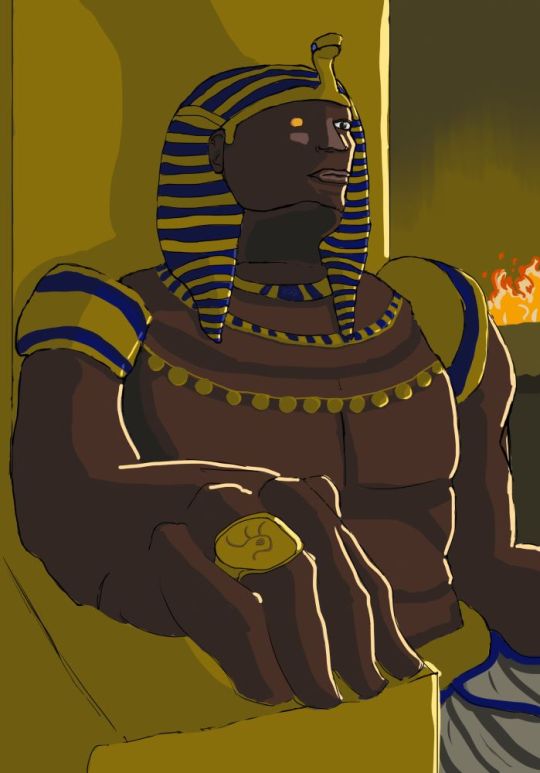
Sometimes you have to draw your favourite shapeshifting bastard ever as an Aspect of Tep.
#toonkind dnd#Aspects of Tep#King Meneshotep#too many twinks in Drafthouse - we go muscle route heeheehoo#this was the whispers of Tep insisting for the neopets Royal Paintbrush#and also me just trying to draw my own characters for the sake of having them on paper#my Egyptian phase was not very intense as a child but it spanned the anime of yu-gi-oh dub and then revived with the Cthulhu mythos books#So now we are here - in Toonkind Dnd#Trying to work an old dream I suppose#He's in Kadash and he sits and gnaws upon my mind as all blorbos do#lore? sure - it's somewhere in my mind half written#art by my hand
3 notes
·
View notes
Text
SAY IT BACK ↪ letting them leave without an ily

finishing up some smaller things from my wip folder before i buckle down and work on the big stuff again. here's this doofy little fluff piece.
characters included: chris redfield, leon kennedy, jill valentine, ada wong
content: fluff. just fluff. established relationship. mildly ooc behavior for the sake of fluff (also known as being in a relationship and acting stupid)

You found it on TikTok - or maybe it was Instagram, or Facebook - doesn't matter. One of the media conglomerates had given you a horrible idea about how to tease your loving, devoted partner.
It's simple - when they said 'I love you' before they left for work, you just wouldn't say it back. What could go wrong?
Chris Redfield ↪
Did not notice. Secure. In his lane. Unbothered. Probably not moisturized. (Get him a nice oil, fragrance free. He'll like it more if you massage it into his muscles for him, spend a little extra time smoothing along the curve of his spine, up and over the tightness of his shoulders.)
If you're at the point with Chris where he's saying “I love you” in place of a goodbye, he doesn't need to hear you say it back. He's confident in your relationship. Hearing it is just a nice bonus.
You're going to get your own feelings hurt here. Sent yourself into a spiral. Like, damn, does he not listen? Does he not care? What the fuck is his deal?
Chris is legitimately confused when you bring it up to him later. Doesn't get the point of the whole thing. “Why wouldn't you just say you love me?” Head cocked to the side, so puppy-like you can practically see the velvety ears flopping over.
Really doesn't do the whole social media thing. Even when you show him videos as an example, he's just shrugging. "I'm pretty sure those are skits, honey. No one really reacts like that."
If only he knew. Hey - at least now you know that Chris is perfectly content in your relationship and won't let anything silly like this bother him. It's just a sign to ramp up the pranks - more practical jokes, less subtle, harmless emotional manipulation.
That's what you thought, at least, but when Chris flips the light off that night and sidles up behind you in bed, strong arms slipping around your middle and tugging you back to him, his voice rumbles in your ear - "You gonna tell me you love me, or is this gonna be a problem?"
And Chris is really good at extracting confessions. How badly do you actually want to get some sleep tonight?
Jill Valentine ↪
Doesn't seem to have noticed that you ignored her. Walked right out the door without missing a step, didn't even glance back. Her car pulls out of the garage, her sunglasses on - she seems entirely unbothered.
Oh, she’s bothered.
Jill Valentine is Not Petty™️. And she does not pout when her partner doesn't say ‘I love you’ back. She's in a pissy mood at work for a completely unrelated reason. She's not returning your texts because she's busy at work, not because she's trying (and failing) to give you a taste of your own medicine.
She definitely doesn't carry that storm cloud all the way home with her, doesn't rain on your parade when you cheerfully announce that dinner's ready and on the table.
You're trying everything you can think of to cheer her up. Asking about work got you a noncommittal shrug. You'd offered to draw a bath for her - or (preferably) for the both of you, but she'd dismissed the idea, talking about how it would take up too much time.
She didn't have the heart to shrug you off when you started massaging her shoulders. Despite your silence in the morning, you were clearly intent on taking care of her. Maybe nothing was wrong. Maybe you just hadn't heard her.
Her palm presses against your cheek, turns you to face her. She searches your eyes for a moment, her gaze unreadable. "Thanks for dinner. I love you."
Nothing. Fucking nothing. "You're welcome."
Jill knows that look on your face, that shit-eating grin that you're trying to cover up by glancing down, by pretending to be flustered. Her hands grip your hips. She manhandles you into her lap, chair scraping against the floor to make room for the both of you.
"Okay - spill. What's up with you?"
Once you explain, she's not mad about the whole thing, not really. But you can't help but notice that she's been withholding kisses lately, and-- wait.
Fuck. Now she's turned the tables on you.
Leon Kennedy ↪
Keeps finding new and inventive ways to double back inside the house. He's not going to outright ask you what's up - that would make him look desperate, which he’s totally not. He’s definitely not concerned at all that you didn’t complete your morning ritual and send him out the door with an ‘I love you’. He’s a big boy - this isn’t high school, this is his very mature, very adult relationship.
Excuse number one: “Sorry, forgot my keys,” as he makes a show of dropping his keys out of his pocket, onto the living room floor. His eyes are on you when he reaches to grab them. Leon tosses them in his hand, making as much noise as he possibly can. “All right, love you.”
You hold strong. Still no ‘love you’ back. He’s gone for all of 60 seconds when he comes back with excuse number two: “Ah, damn, forgot my badge. I’d lose my head if it wasn’t attached.”
His badge is attached to his belt. You can literally see it. When you point that out to him, he makes a show of being relieved, goes so far as to press a kiss to your temple, and says, “God, what would I do without you? Love ya. Have a good day.”
But you hold strong. Until excuse number three:
“Babe, have you seen my gun?”
You laugh, which only makes him laugh - and then he hits you with ‘no, seriously’ while he leans against the doorway, hip cocked. He’s got you figured out by now, knows that if he can make you laugh then you’re not doing this because you’re mad at him or anything. He can't even be mad when you explain it to him. He can only warn you:
"I'm gonna get you for this. Now, c'mon - say it."
Ada Wong ↪
I don't know why you would do this to her to be honest. She just said ‘I love you’. You should be marking your calendar and turning this into a holiday.
She doesn't say it often, at least not while you're conscious. Whether she presses her sentiments into your hair while you sleep against her, drooling against her collar bone, is up for debate. You have no hard evidence and she'll deny the allegations.
It simultaneously is and is not a big deal. She didn't say it because she craved the validation of having you repeat it to her. She said it because she meant it. There's so few concrete truths about herself that she can share with you, but that was one of them. Does it sting a little not to have it returned? Maybe.
She turns the moment over and over in her head, letting it haunt her. You had given her time, she thinks, why can't she give you yours? But your silence is a specter that tinges every moment. It creeps at the edges of every thought, it–
“Hey, you forgot your coffee.”
She turns to see you in the door of your apartment, hanging from the frame with one hand, her cup extended to her in the other. She clicks back to you in her stilettos, and your press a kiss to her cheek when she claims her drink. The guilt of it all ate at you before you could let her leave your sight. “Love you. Be safe.”
She'd spiraled before she even got down to the parking lot. Total loser in love.
#leon kennedy x reader#chris redfield x reader#jill valentine x reader#ada wong x reader#resident evil x reader#resident evil fluff#resident evil headcanons#leon s kennedy x reader#leon kennedy x you#chris redfield x you#jill valentine x you#leon kennedy#jill valentine#chris redfield#ada wong#leon kennedy fluff
566 notes
·
View notes
Text
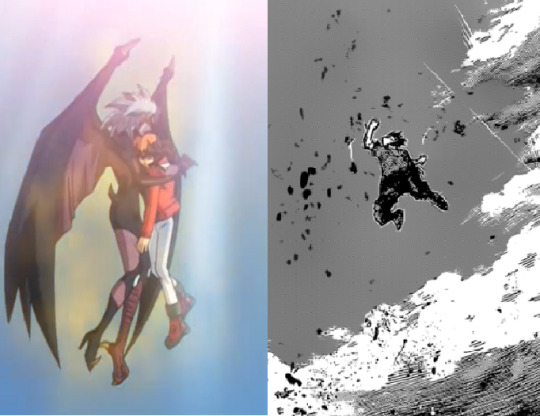
SHIGARAKI VS. YUBEL: HOW TO SAVE YOUR VILLAIN
The failure of Deku to save Shigaraki isn’t just a tragic conclusion for Shigaraki’s arc, it’s also My Hero Academia failing as a story. When I say the story failed, I mean the story has failed to answer any of the questions it asked its audience. It’s themes, character arcs, everything that communicates the meaning of the story to the audience is no longer clear.
Saving Shigaraki was the central goal of not only the story itself, but the main character Deku. By failing in its goal you can’t call this a good ending. In order to illustrate why this goal of saving the villain is so important to both Deku’s character and the central idea of MHA, I’m going to provide a positive example in Yu-Gi-Oh GX were the main character Judai successfully saves their villain.
One of these stories fails, and the other succeeds. I will illustrate why under the cut.
BROKEN THEMES = BROKEN STORY
When artists draw they have to consider things like perspective, anatomy, shading, light, coloring. Drawing has rules, and it’s hard to produce good art without knowing these rules beforehand. If I draw something that has bad anatomy, you can criticize me for that.
Writing has rules, just like drawing. The rules of storytelling are important because writing is an act of communication. You can write whatever you want, just like how you can draw whatever you want, but if you break the rules the audience won’t understand what you are trying to communicate.
When I refer to MHA as a broken story, I am referring to the fact that it has broken the rules of storytelling. As this youtuber explains.
“I guess we should first define what broke and broken even means in this context. Has the story turned into an unintelligible mess? Not really. Value judgements aside, the narrative is still functional and fulfills the criteria of being a story. So how can a story that still functions be broken? Maybe to you it cannot. But to me a story that is still functional isn’t enough. What I mean when I say MHA is broken is that it’s lost something crucial. A codifying style of structure, pacing and payoff that until a certain point was the core of its identity.”
I could launch into a long-winded explanation of what themes are, but for the sake of simplicity I like to define themes in terms of “Ask, and answer.” The author asks a question to the audience, and then by the end of the story provides an answer. The audience is also invited to come up with their own answer which prompts them to think about the story on a deeper level.
The question both MHA and GX are asking both its main characters and the audience is “Can you save the villain?” with the additional complicated question of “Should you save the villain?”
This post will detail how both stories go about answering those two questions, and more importantly why those answers matter for the story.
With Great Power… You know the rest.
My Hero Academia and Yu-Gi-Oh Gx are actually similar stories once you get past their superficial differences. MHA is a story with way better worldbuilding, compared to a society where everything revolves around the trading card game, and people go to school to be better at a trading card game.
However, if you get past that. They are both bildungsroman, stories about the main characters growing up into adults. They both have an academy setting where the goal is for the main character to graduate and enter the adult world. They are both shonen manga. GX is the sequel of Yu-Gi-Oh a manga that ran in Shonen Jump the exact same magazine as MHA.
The biggest point of comparison is their main characters, who both start out as young and naive who are driven by their admiration of heroes. Deku is a fan of All Might who wants to become a hero despite not having a quirk, because he loves All might who saves everyone with a smile. Judai’s entire deck archetype revolves around “Elemental Heroes’ and later “Neo-Spacians” who are all based on popular sentai heroes like ultraman.
The central arc for both characters is to grow up. Growing up for both of them not only requires figuring out what kind of adult they want to be, but also what kind of hero they want to be.
Now I’m going to drastically oversimplify what a character arc is.
A character arc first starts out with the character being wrong. Being wrong is essential because if the character is right from the beginning, then there’s no point in telling the story. A character often holds the wrong idea about the world, or has some sort of flaw that hinders their growth.
The narrative then needs to challenge them on that flaw. It usually sets up some kind of goal or win condition. That flaw gets in the way of a character “winning” or achieving their goal, so they need to fix that flaw first.
If their ideals are wrong, then they need to think about what the right ideals are. If they’re too childish, they need to grow up. If they have unhealthy behaviors or coping mechanisms, they need to unlearn it and require better ones. Otherwise, that flaw will keep sabotaging them until the end.
I’m borrowing the word “win condition” from class1akids here because it’s an incredibly appropriate terminology. Midoriya needs to do “x” in order to win, otherwise this victory doesn’t feel earned. The “x” in this case is usually character development. As I said before, a story where the main character hasn’t changed from beginning to end feels pointless. Especially in Deku’s case, he was already a brave, strong hero who would charge right into battle and defeat the bad guys in chapter one, so him defeating Shigaraki in a fist fight doesn’t represent a change.
The story sets up not only “What does the hero need to do to win?” but also “How does the hero need to change in order to win?” A character either meets these requirements before the end of the story, or they don’t and usually this results in a negative ending.
MHA in its first half quite clearly set up both the final conflict of saving the villains, and also that saving the villains is its “win conditions.” The hero shouldn't be allowed to win without first fixing this flaw.
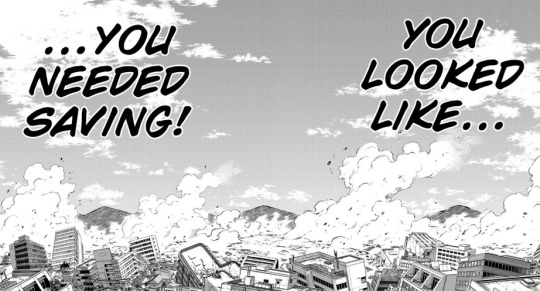
From this panel onward the central question Deku is forced to answer shifts from “Am I strong enough to defeat ShigarakI” to “Can I save Shigaraki?” However, much earlier than that All Might goes on to basically set up the win conditions of what makes the ultimate hero as someone who “Saves by winning, and wins by saving.”
All might: You can become the ultimate heroes. Ones who save by winning, and win by saving.
Therefore the story has set it’s criteria for what kind of hero Deku needs to become. If he wins without saving, then he’s failed to become what the series has set up as the Ultimate Hero.
Shigaraki and Yubel aren’t just narrative obstacles, or boss monsters to be killed like in a video game. They are narrative challenges, which means that the character can’t grow in any way if they don’t answer the challenge presented by the characters. They are villains who actively resist being saved, to provide a challenge for two heroes who define their heroism by saving others.
The challenge they pose adds a third question to the story and the main characters.
"Can I save the villain?"
"Should I save the villain?"
"If I don't save the villain, then can I really call myself a hero?"
In other words the decision they make in saving, or not saving their final antagonist defines what kind of hero they are. In Deku’s case it’s even more critical he defines what hero he wants to be because the MHA is also a generational story, and several of the kids are asked to prove how exactly this generation of heroes is going to surpass the last one.
The kids growing physically stronger than the last generation isn’t a satisfactory answer, Deku getting strong enough to punch Shigaraki hard is not a satisfactory answer, because we are reading a story and not watching a boxing match.
I’m going to focus on the last two questions though for a moment. Many people who argue against saving villains like Shigaraki argue he is a mass murderer and therefore isn’t worthy of salvation.
However, the act of saving Shigaraki isn’t a reflection of Shigaraki himself, but rather the kind of hero Deku wants to be. It all boils down to Spiderman.
In the opening issue of Spiderman, teenage Peter Parker is bitten by a radioactive spider and suddenly gains super strength, the ability to stick to walls along with other powers. However, being a teenager he uses these powers selfishly at first. He doesn’t feel the obligation to use his powers for other people, and therefore when he sees a robbery happening right in front of him he lets the robber go.
However, because he lets the robber go, the robber then attempts to hijack a car and kills his Uncle Ben in the process. If Spiderman had stopped the robber then he might have prevented that from happening. He had the power to stop the robber, but he didn’t feel responsible or obligated to save other people. As a result Uncle Ben dies. It’s not enough to have power, ti’s how you use that power that reflects who you are, therefore: “with great power comes great responsibility.”
The choice to save Shigaraki actually has little to do with whether or not Shigaraki is redeemable, but rather how Deku chooses to use his power, and what he thinks he is responsible for reflects who Deku is as a person.
Deku himself also clearly outlines how he wants to use his power, that One for All is a power for saving, and not killing.
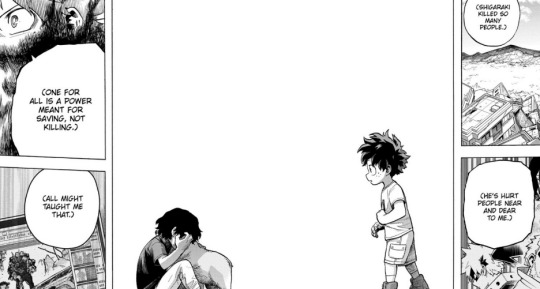
How he uses his power reflects Deku’s ideal in saving others, and therefore if he doesnt use his power to save, then he’s failed to live up to his ideals. It's not whether it's morally right to save a murderer like Shigaraki, but rather the way Deku wants to choose to use his power. It's about whether he feels the responsibility to save others.
Judai explores an incredibly similar arc to Deku. They are basically both asked what kind of responsibilities a hero is supposed to have, which is also a metaphor for growing up to handle the responsibilities of adulthood. As both characters start out with incredibly naive and childish ideas about what a hero is. Therefore realizing what a hero is responsible for is key to them growing as a character.
However, Judai is different from Deku. In some ways he’s more like Bakugo. Judai is a prodigy who’s naturally good at dueling. He doesn’t duel to save others, but rather because duels are fun and he’s good at it. He’s very much like Bakugo, who admired All Might as a hero just as much as Deku did, but admired the fact that he was strong and always won rather than he saved others.
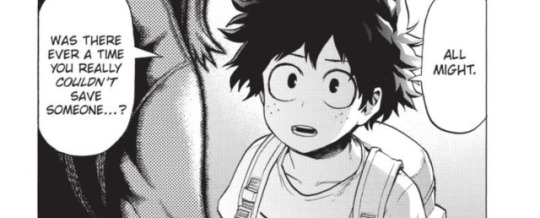
However, I would say both Deku and Judai are questioning what a hero is responsible for. They are both asking if they have the responsibility to use their power to save others. If they have to fight for other people, just because they have power.
His first big challenge as a character comes from Edo Phoenix, who calls out Judai for not thinking through what it means to be a hero, and what responsibilities heroes carry. Judai duels because he thinks it’s fun. He will show up to duel to help his friends, but that’s because he’s the most powerful person in the group. Even then it’s because he finds fighting strong opponents to be enjoyable. Bakugo will beat up a villain, but for him it’s more about winning then if the action will save someone or not.
Judai is more often than not pushed into the role of being a hero, he doesn’t play the hero because he’s a particularly selfless person, and he’ll often avoid responsibility if not forced. He has power but no sense of responsibility and the narrative calls them out as a problem.
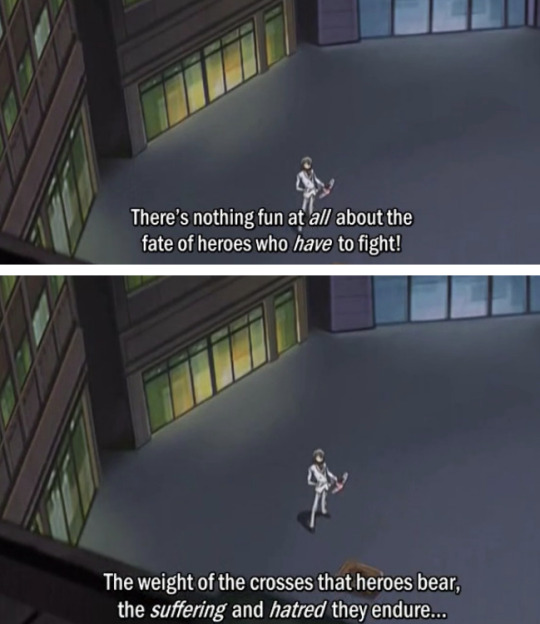
Edo: Can you even fathom that, Judai?
For Judai, he can’t understand the responsibility of being a hero. For Deku, he idealizes heroes so much he can’t understand that there are people out there the heroes have failed to save. These two callouts towards Deku and Judai are discussing similar because they’re both discussing where a hero’s responsibilities lie. Is a hero responsible for saving everyone? Is someone strong like Judai responsible for using their strength to help other people?
Judai’s arc continues into the third season where he’s not shown to just be naive but ignorant. He’s not just childish, he actively resists growing up because he doesn’t want to take on adult responsibilities.
THe same way that Deku just decides not to think about whether or not All Might failed to save people in the panels above. However, in Judai's case he's actively called out for his choice to remain ignorant.
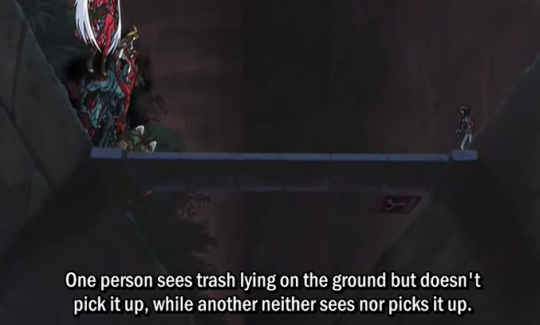
Satou: Now, which one is at fault?
Judai: Isn’t it the guy who saw it, but didn’t pick it up.
Satou: Not quite. If one is aware of the trash that fell, it may be picked up someday. But there is no possibility fo the unaware one ever picking it up. Judai-kun you are the foolish one unaware of the trash that has fallen.
Judai: Are you calling me out for how I am?
Satou: Your behavior towards me was atrocious. The worst was attending class only for credit, even if you were there you only slept.
Judai: Yeah, I know. I was all bad, but it wasn’t that big a-
Satou: It is important. You see, one by one, the students inspired by your attitude were losing their motivation. Now if you were a mediocre duelist, then this would not be an issue.
Satou: However, you are the same hero who defeated the three mythic demons. Every single student in the academy admires you. You should have been a model for this academy.
Judai: Me, a role model? Are you kidding? I just do whatever I feel like doing.
Satou: Great power comes with great responsibility. Yet, as you remain unaware of that, you’ve spread your lethargy and self-indulgence.
seems like a minor issue, but look how Judai responds to the accusations. “I just do whatever I feel like doing.” Satou is arguing that Judai should pay attention to the influence he has on others because of his power, because how he chooses to use that power affects others. However, Judai chooses to actively not look at the consequences of his actions because he doesn’t want to take on that level of responsibility, and therefore he’s looking away from the trash.
While it seems like it doesn’t matter in Satou’s specific example, not thinking of the consequences, or how you use your power can have unexpected consequences. Spiderman doesn’t feel like it’s his responsibility to stop a bank robber, and that bank robber shoots his uncle. You could still argue it’s not Spiderman’s responsibility to stop every crime in the world, and I guess no one owes anyone anything from that point of view - but Spiderman failing to act responsibility had the consequence of directly hurting someone else.
Spiderman has to live with that consequence because it was his own Uncle that was hurt.
This is where we really reach the duality of Judai.
In GX, Judai is, symbolically speaking, The Fool of the Tarot Deck, the Novice Alchemist — a person brimming with infinite potential, yet one who is also supremely ignorant, who walks forward with his eyes closed and often unknowingly causes harm in his great ignorance. In this, he is very much the embodiment of the faults we most commonly associate with teenagers — selfishness, recklessness, shallowness, a lack of dedication or empathy when it’s most needed. Like most people, he has good traits that work to balance out some of the above, but his narrative path through GX ends up being that of the flawed hero undone by his faults — and then that of the atoner, the repentant sinner. In his case, the mistakes of his teenage years are the catalyst for his growth from a boy into a man burdened with duty and purpose.
Judai is someone with infinite potential, with great power, but also ignorant on how he should use that power, and that makes him an incredibly flawed hero who needs to learn how that power should be used.
Deku similarly exists in a society where heroes deliberately turn a blind eye to the suffering of a certain type of victim. Shigaraki’s speech heavily resmebles Satou’s speech about garbage on the side of the road.
Shigarali: "For generations you pretended not to see those you coudln't protect and swept their pain under the rug. It's tainted everything you've built."
Deku shares Judai’s ignorance, because he’s not only a part of a system that doesn’t even see trash on the side of the road, but he also worships heroes so much that he’s incapable of criticizing them. If Deku saw the flaws of heroes, but at first didn’t have the courage to speak out, but eventually gained the courage that would be one thing. However, if he doesn’t see the flaws of heroes, then the problem will never be fixed.
There are also consequences for both Judai and Deku failing to use their powers responsibly. These consequences take the form of the villains who came about because of all of society’s ignorance to the suffering of victims (Shigaraki) and because of the main character’s ignorance to their suffering (Yubel). Shigaraki and Yubel are also explicitly victims that the heroes failed to save, turned into villains who are active threats to the heroes.
Should I save the villain?
The answer is yes, because the decision to save is reflective of the kind of hero each character wants to be. Each story clearly sets up that Deku and Judai aren’t punisher style heroes who shoot their villains, they are being set up as heroes who save.
Deku needs to “save by winning.”
As for Judai, a big deal is made of Judai’s admiration for another character Johan who represents a more idealistic kind of hero. Johan unlike Judai is someone who duels with a purpose, something Judai outright says he admires because he’s empty in comparison.
Judai: Johan what have you been dueling for? See, it’s about fun for me… Well, for the surprise and happiness too. I guess I do do it for the fun. Sorry, I guess I put you on the spot by asking out of nowhere.
Johan: What’s this about Judai?
Judai: It’s nothing.
Johan: I suppose there is one goal I have.
Johan: Even if someone doesn’t have the power to see spirits, they can still form a bond with a spirit. That’s why I do it for people like him.
[...]
Johan: I'll fight for everyone who believes in me, and I'll do it with my Duel Monsters.
Judai: I'm jealous you've got feelings like those in you.
Becoming a hero who uses their power to help others isn’t just a goal the story sets for Judai, it’s a goal that Judai sets for himself because of his admiration for Johan. Johan represents the idealistic hero Judai wants to be, but is also held back from because of his personality flaws. Johan represents the kind of heroic ideal that Deku is aspiring to be.
Johan’s ultimate goal isn’t punishing the wicked, but to use his power to save others.
Johan: Judai, it was my dream to save everyone through my dueling!
The story sets up the idea that it’s not enough for Judai to simply be strong, he’s also challenged to become a savior who uses his power to help others like Johan.
Deku needs to “save by winning” and Judai needs to “Save everyone through his dueling.” However, Johan also adds another condition to what saving means. His idea of saving isn’t to defeat a villain, but rather his dream is to help connect spirits and humans together, even if there are humans who can’t see spirits. Johan doesn’t save people with the power of physical force, but rather the power of human connection.
Should I save the villain?
Here the answer is "Yes", because wants to become more like Johan someone who uses their power to help others not just for themselves.
Then we reach the third question
If I don't save the villain, can I really call myself a hero?
It once again comes to power and responsibility. Heroes have great power, and they are responsible in how they use that power, if they use it irresponsibly then there are consequences. Shigaraki wants to destroy hero society, because the heroes irresponsibly use their power to turn a blind eye to everyone’s suffering.
People suffer when heroes fail to live up to their responsibilities.
The entire conflict of season 3 is created by Judai failing to save Yubel. If Judai had helped Yubel when they most needed it, instead of abandoning them, then Yubel would never have been twisted by the light of destruction, would never have attempted to teleport the school to another dimension, would never have attacked all of JUdai’s friends.
These consequences matter.
Deku can turn his eyes away from Shigaraki’s suffering, but let’s say a hero failed to stop a robbery, or rather he didn’t even try, and because of that his mom was shot and died in the street.
Would Deku consider the man who failed to stop a bank robbery a hero?
When Spiderman let a bank robber go instead of trying to stop him, was he being a hero in that moment?
Both the stories and the characters themselves have defined heroes as people who use their powers to save others, therefore if Judai and Yubel fail to save their villains then they can’t be called heroes by the story’s own definition. Now let’s finally return to the question of "Can I save the villain?"
Was there ever someone you couldn’t save?
m going to start with Yu-Gi-Oh Gx as a positive example of how to save your villain.
Gx works for two reasons. One, it’s established from the start that Yubel isn’t beyond salvation, and two, it makes it so Judai can’t win without saving Yubel. The conflict of the story does not end until Judai makes the decision to save Yubel.
In some ways the writing is even stronger because Judai is directly responsible for the pain and suffering that Yubel went through that turned them into a villain in the first place. Yubel isn’t just a victim, they’re specifically Judai’s victim.
Yubel is a duel spirit who is also essentially Judai’s childhood friend. A duel spirit just like the kind that Johan wants to save. During their childhood Yubel got too overprotective of Judai, and started to curse his friends for making him cry or upsetting him in any way. Until everyone Judai’s age started avoiding him and Judai became all alone with only Yubel for company.
Judai’s decision was to abandon Yubel at that time. He took the yubel card and shot them into space, hoping that being bathed in space rays will somehow “fix” what was wrong with them. I know that’s silly but just go with it. Judai abandoning Yubel had the unintended consequence of Yubel being subjected to the light of destruction, a corrupting light that subjected Yubel to years of pain. This pain literally takes the form of Yubel burning alive.
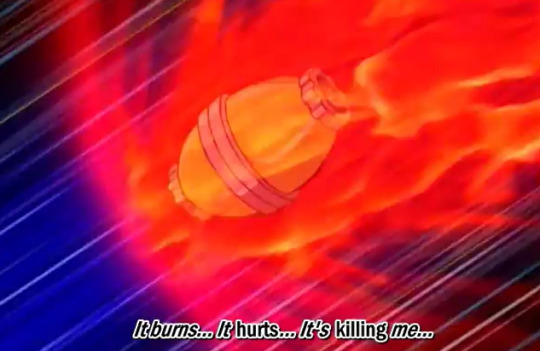
Yubel connected to his dreams called out for Judai every night, only for Judai’s parents to give him surgery that repressed his memories of Yubel causing him to forget them entirely. Yubel then spent the next ten years alone in space, continuously subjected to painful torture, with their cries for help being ignored.
"I was suffering even as you came to forget about me..."
Yubel is then met with the question of how can Judai treat them this way if they loved him so much? As from Yubel’s perspective, they’ve only ever tried to protect Judai, only for Judai to not only throw them away, but subject them to painful torture and ignore their cries for help. Judai effectively moves on with his life, goes to duel academy, makes friends while Yubel is left to suffer in silence all but forgotten.
This is where Judai’s ignorance has serious plot consequences.
It’s not just the pain that Yubel endured that made them snap. It’s that their pain went ignored.
Yubel holds out the faint hope that Judai will answer their calls fro help until they finally burn up upon re-entry into earth’s orbit. At which point they’re left as nothing more than a single hand crawling on the ground.
Yubel who cannot fathom why Judai would cause them so much pain, and then forget about them, convinces themselves that Judai must be causing them pain, BECAUSE he loves them.
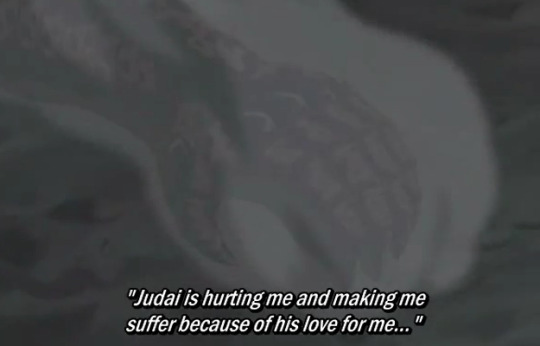
But you see, I couldn't possibly forget about you in the time that I've suffered...
Judai is allowed to move on with his life, to make friends, to spend the next ten years doing so while Yubel is subjected to ten years of agony. When they finally escape their painful torment, they see all the friends Judai has made while they’re left alone and forgotten.
However, Yubel’s goal isn’t revenge. Rather, it’s to make Judai share and recognize their pain. WHich is why I said it’s not the fact that they were made to suffer, but their suffering is ignored. Yubel’s entire philosophy revolves around the idea that sharing pain is an expression of love, and that they and Judai share their love for each other by hurting each other.
"That's why I sought to fill all those linked to you, your world, with both sadness and anguish..."
For Yubel, making all of Judai’s friends suffer and Judai themselves suffer is a way of making them and Judai equals again. They want to show “their love” for Judai, but it’s more about forcing Judai to recognize the pain he’s caused them by forcing him through the same pain.
Yubel’s philosophy of sharing pain is actually a twisted form of empathy.
They’re not entirely wrong either, that even people who love each other can cause each other pain, and that if one person is suffering alone in a relationship or the suffering is one-sided then there’s something wrong with that relationship.
Yubel: I get it now… You weren’t in love, with Echo.
Yubel: No.. you may have loved her just enough to clear the conditions in palace for you to control Exodia, but the you didn’t truly love each other.
Yubel: You were only unfairly hurting her, while you stayed unharmed. You wouldn’t suffer. You wouldn’t suffer. You wouldn’t be in pain.
Amon: What are you getting at?
Yubel: I’ve been hurt! I’ve suffered! I’ve been in pain. That’s why I’m making JUdai feel the same things I did!
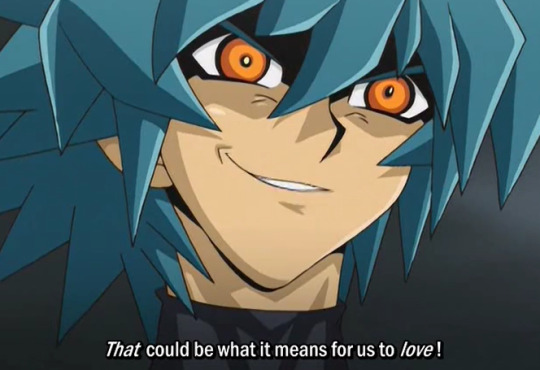
Yubel’s twisted theory of love, is a pretty thinly veiled cry for empathy.
They break out into tears when talking to Amon about the way they’ve hurt and suffered. They clearly state upfront that their goal is for Judai to recognize their love. One of the first things they say to Judai is a plea for Judai to remember them.
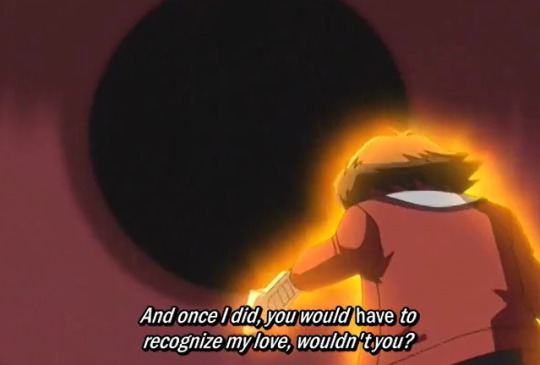
Yubel is presented as a very human character suffering through a lot of pain throughout their entire villai arc, they break down into tears multiple times, they cry out in agony, they're visibly suffering and you see their mental walls begin to break down when Judai denies them any empathy.
Yubel is actually incredibly clear and straightforward about their desire to be saved by Judai. However, Judai doesn’t lift a single finger to help Yubel the entire arc, even though they themselves admit they are directly responsible for Yubel’s suffering but they helped create who they are today.
Judai plunges into a different dimension and gives up everything to save someone, but it’s Johan, not Yubel they try to save. You have Johan, the perfect friend, and perfect victim that Judai gets obsessed over and will not stop at anything to save, and then you have Yubel, the imperfect victim that is actively harming Judai and all of his friends that Judai chooses to ignore.
The whole season Judai only focuses on saving the perfect victim Johan, and this is clearly shown to be a flaw. Judai doesn’t just ignore Yubel to save Johan, he also ignores every single one of his friends.
Judai only caring about saving Johan, and deliberately ignoring and abandoning the friends who came with him to help, essentially abandoning them the way he did Yubel leads to another consequence. After he abandons them they get captured, rounded up, and actually die and become human sacrifices.
Losing his friends, causes Judai to snap. Judai becomes the supreme king and decides power is all that matters; he starts killing duel spirits en masse in order to forge the super polymerization card. Which means being left alone, suffering alone, being abandoned by everyone causes Judai to snap the exact same way that Yubel did.
In fact Judai is only saved from his darkest moment, because two of his friends sacrifice their lives, trying to get through to him and appeal to his humanity. At that point Judai’s friends could have just chosen to put him down like a mad dog, to punish him for the amount of people he’s killed, but instead they try to save him because of their friendship.
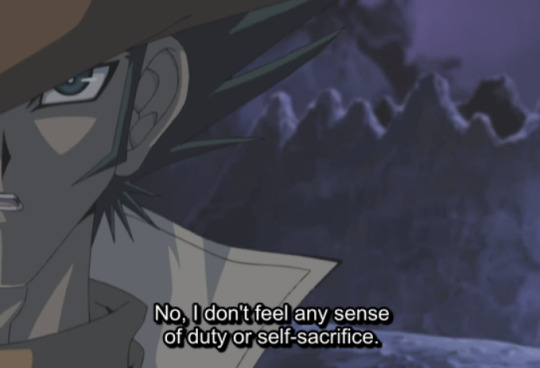
I just want to save my friend. That is all.
By the time Judai is facing Yubel in their final fight, Judai doesn’t have the moral highground against Yubel in any way whatsoever. They’ve both lashed out because of the pain they endured and killed countless people in the process of lashing out.
The only real difference between them is that Judai is lucky. He had friends to support him at his lowest point, while Yubel didn’t. Does Judai learn from Jim’s example, and go out of their way to save Yubel the same way they were saved because Yubel is still a friend?
Nope, Judai tries to kill Yubel at this point.
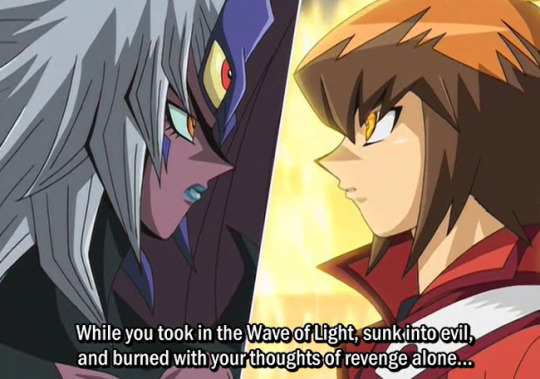
I made a lot of friends...
And they all taught me something… real love is wide enough, large enough and deep enough to fill the universe. Your so-called love is only a conceited delusion.
Like, Judai, sweetie baby honey darling. How was Yubel supposed to make friends when they were floating in the empty void of space?
Judai hasn’t learned, they are still ignorant, and still turn a blind eye to Yubel’s suffering. After all if his love is wide enough, large enough,and deep enough to fill the universe then why don’t thy have any room in their heart whatsoever for empathizing with Yubel?
Judai making friends while Yubel was trapped in space doesn’t make Judai a better person than Yubel, it makes Judai lucky. Judai doesn’t even appreciate that luck, because he treats his friends like garbage.
It’s not about whether Yubel is worthy of salvation, because Judai is a mass murderer and his friends still went to great lengths to save them anyway. It’s that Judai doesn’t want to empathize with Yubel, because they still want to remain ignorant and irresponsible.
Judai wants to continue playing hero, with a very black and white definition of what a hero is. By this point Judai’s killed lots of people, but if he makes Yubel the villain in the situation, he can keep playing hero. He doesn’t have to look at himself and what he’s done, because blaming everything that happened on Yubel and then putting Yubel down like a mad dog allows Judai to absolve his own guilt. Judai practically ignores Yubel’s cries for help, even when Yubel spells it out for them.

I couldn't have lived with the heartache unless I felt that I was being loved...
At this point Yubel themselves acknowledges that their love was just a delusion. That it was a coping mechanism, because they couldn’t live with all the pain otherwise. WIthout it they would have just died, which makes Judai unmoved.
The implication here is that Judai thinks yes, Yubel should have just died in that crater. It would have been easier for Yubel to die a perfect victim, then for Yubel to crawl out of that crater and go on to hurt other people.
While that may be true the same can be said for Judai - it would have been better if Judai died rather than become the Supreme King. His friends could have put him down like a mad dog, you could have even called that justice - but they didn’t.
Judai making no attempt to save Yubel isn’t because he thinks it’s morally wrong to save someone who’s killed as many people as Yubel has, or because he thinks he can’t forgive Yubel, it’s because Judai is taking the easy way out. Johan is a nice, easy victim to save, because he’s Judai’s perfect boyfriend, while Yubel is a complex victim that requires Judai to understand their suffering.
Even the act of saving Johan isn’t about Johan himself, it’s about the fact that Judai feels guilt over Johan’s disappearance. What Judai wants isn’t really to save a friend, but to stop feeling guilty over that friend. Judai isn’t just disgusted by Yubel’s actions towards his friend, he also wants to avoid the guilt he feels over causing all of Yubel’s suffering, because it requires acknowledging the complex reality that he is both victim and perpretrator in this case, just as Yubel is both victim and perpetrator.
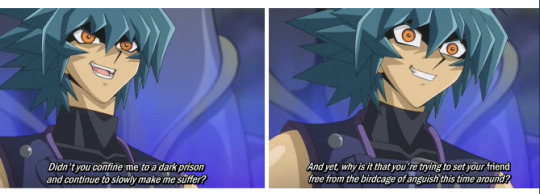
So how can an arc where Judai doesn’t try to save Yubel until the last possible minute, be better than an arc where Deku makes it his goal for the final act of the manga to save the crying boy in Shigaraki?
It’s because the story does not let Judai get away with his continual refusal to empathize with Yubel. Yubel’s entire character revolves around empathy, in the form of sharing pain.
As a duel monster, Yubel’s effect is that they are a 0/0 attack monster who is immune to all damage, but when you attack them they deal all the damage back to you. Which means that Yubel will respond to all the pain they feel, by causing you just as much pain in return.
Yubel is not a character who can be defeated in a fight, or a duel. In fact they’re the only Yu-Gi-Oh villain who never loses a duel once. The most Judai can do is duel them to a draw, and they draw three times. Yubel wins against everyone else who challenges them.
In a way Yubel is like Shigaraki, the ultimate, unkillable enemy that can’t be done away with violence. Judai’s refusal to empathize with Yubel or attempt communication also makes them worse, every time Yubel is hurt they escalate. THe more Judai hurts them, the more they will hurt in return, it’s a cycle that will never be broken simply by killing Yubel, because Yubel is unkillable.
Not only that but the story has gone to great lengths to show that saving Yubel is the correct course of action. If Judai doesn’t save Yubel, he’s basically spitting on the selflessness Jim showed in saving him. In fact if he doesn’t save Yubel, Judai is contradicting his own words on what makes a good friend.
Sho once asks Judai after witnessing his brother change, what he should do if a person you lov ehas changed into an entirely different person. What if they're a person you don't even recognize any more? A person you don’t even necessarily like anymore?
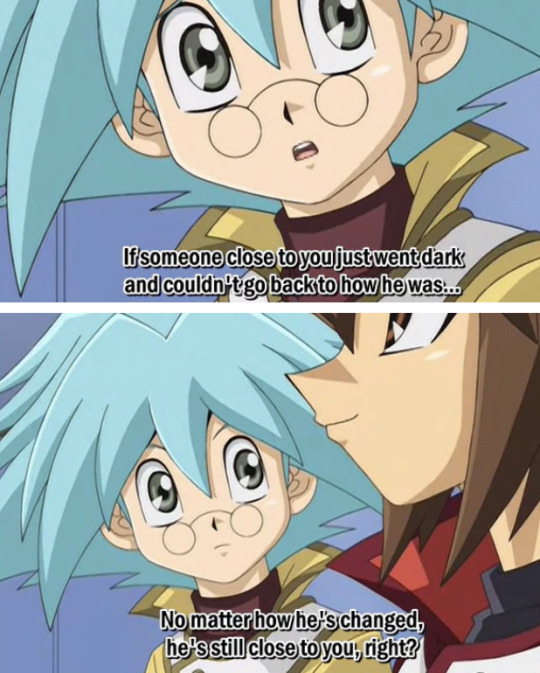
That's why if it were me. I'd probably just be looking after him until the very end, even if I didn't like him. I'd do it cause I think it'd prove that I care about him.
Judai doesn't even say that Sho is obligated to save his brother or morally redeem him, just that he has to keep looking at him instead of turning away or ignoring him.
Judai is being a bad friend, by his own definition. By choosing to deliberately look away from Yubel, Judai’s not living up to his advice for Sho for how you treat people you care about.
Which is why the resolution for Judai and Yubel’s arc is so important, because it’s done by Judai finally acknowledging Yubel’s pain, and promising to watch over them from now on, words that are followed by the action of physically fusing their souls together so they’ll never be alone again.
Judai doesn’t just say pretty words about how they won’t ignore the crying child inside of Yubel, but instead he makes a sacrifice to save Yubel at risk to themselves to show their words are backed up by actions. Judai says Yubel will never be alone again, and then he commits.
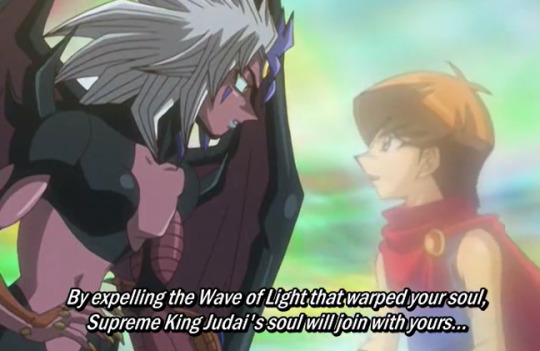
"And even if that means I won't exist anymore... I don't care."
Judai has resolved his character arc by this action, because Judai is finally taking on responsibility and that responsibility is watching over Yubel, so the two of them can atone together. Judai even says himself this isn’t an act of sacrifice on his part, but rather him finally accepting adult responsibilities.
Judai: I wouldn't sacrifice myself for you guys. I'm just going on a journey to grow from a kid into a man.
Judai needed to save Yubel to complete his character arc and grow as a person. If Judai hadn’t saved Yubel, he would have still remained an ignorant child. By learning not to turn a blind eye to Yubel’s pain, and also smacking sacrifices and physically doing something to atone for the way they ignored Yubel up until this point they’ve not only saved Yubel they’ve also done something to address their wrongs.
This also continues into the fourth season where Judai’s personal growth results in him learning what kind of hero he wants to be as in Season 4 in order to atone for the spirits that Judai slaughtered, he decides to leave his friends behind and walk the earth with Yubel helping spirits and humans get along with each other.
In fact Judai’s final speech as a character isn’t even about how strong he is as a hero, but how weak he is as a person.
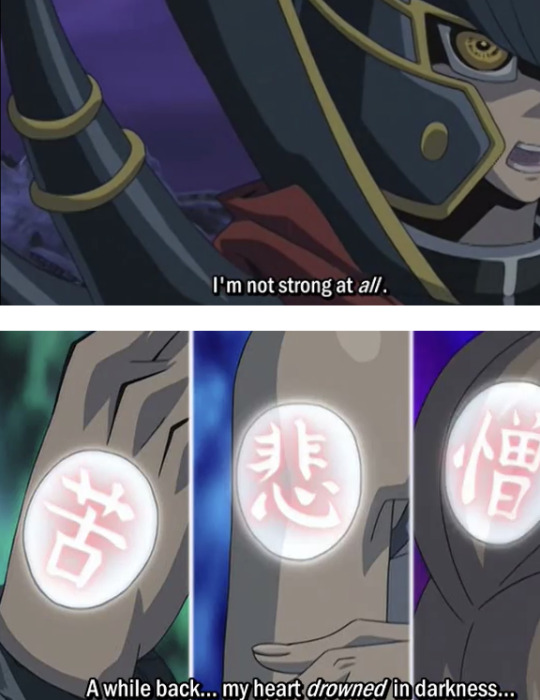
And I put my friends through some rough times. Form that, I figured a few things out... all I can do is believe in them.
The lesson Judai learned is because he’s weak, he needs to empathize and believe in other people the same way that his friends once believed in him when he was at his lowest point. Judai’s not the strongest hero, he’s the weakest one, but that gives him the ability to empathize with people who were lost just like he was, and guide them back from the darkness.
The story of how Deku became the worst hero.
I’m going to say this right now it might turn out next week that Shigaraki is just fine, and he’ll use the overhaul quirk to reconstruct his body. However, even if that happens Deku has completely failed at his goal of saving Shigaraki for the reasons I’ll illustrate below.
In theory, Deku’s arc of saving Shigaraki, and therefore winning by saving should be much easier for the story to accomplish and also much less frustrating to watch. After all, Shigaraki has been around since the beginning of the manga, he’s literally the first villain that Deku faces. He’s also the first villain that Deku talks to, where he brings up the idea that there were some people All Might failed to save.
There’s also many intentional parallels between the two characters, the entire manga is about their parallel journeys of becoming the next generation hero and the next generation villain. Shigaraki even directly quotes the line at one point that all he wanted was for someone in his house to tell him he could still be a hero, the same line Deku said in the first chapter was that he wanted his mom to tell him to be a hero instead of apoalogizing to him for being quirkless.
Not only is the setup for Shigaraki and Deku made obvious (Deku can redeem Shigaraki by telling him that he can still be a hero too), but Deku himself states out loud that he wants to save the crying child inside of Shigaraki.
Judai runs away from Yubel the whole time, whereas Deku is running towards Shigaraki and actively makes it his goal to understand Shigaraki and continue to see him as a human being rather than a villain.
The story also makes it clear that saving Shigaraki is necessary to saving hero society as a whole. After all Yubel is just Judai’s victim. Whereas Shigaraki is the victim of all of society. He’s the crying child who was ignored. The cycle won’t be broken if heroes continue choosing to ignore people like Shigaraki, because more victims will grow up to replace him.
Shigaraki: Everything I've witnessed, this whole system you've built has always rejected me. Now I'm ready to reject it. That's why I destroy. That's why I took this power formyself? Simple enough, yeah? I don't care if you don't understand. That's what makes us heroes and villains.
Shigaraki rejects the world because the world continues to reject him. THe solution to this problem is not rejecting Shigaraki, because Shigaraki won’t go away, the system will just continue to reject people like Shigaraki. As long as heroes and villains don’t understand each other, they’ll keep being forced to fight and the conflict won’t end, because hero society is what engineers it’s own villains.
clear as day by the story itself. If the objective of saving Shigaraki is clear, then how exactly did the story fail in this objective? What went wrong?
In this case it’s a failure of framing, and breaking the rules of “show don’t tell.”
Stories are all about actions and consequences. When a character makes a certain action in a story, the way other characters around them, the world, and whatever consequences that action frames that action in a certain light. It provides context for how we are supposed to interpret that character in that moment.
For example, when a character does something wrong and another character directly confronts them over what they did wrong, that frames them as in the wrong. The story is criticizing the character for what they did wrong.
Context is everything in a story. Stories are just ideas, so they require framing and context to communicate those ideas for the audience. Certain character attributes can be strengths or flaws depending on the context.
My go to example is that if you put Othello in Hamlet, the conflict would be resolved in five seconds because Othello’s straightforward personality and determination would have him kill Hamlet’s uncle without questioning things. Whereas, Hamlet constantly questioning and second guessing himself would lead to the worst ending possible. However, if you put Hamlet in Othello, then Hamlet wouldn’t fall prey to Iago’s manipulations, because Othello doubts and questions everything so he wouldn’t believe Iago the way Othello did.
Hamlet’s contemplative and introverted nature can be a strength in one situation, and a flaw in another. Othello’s tendency to act without thinking things through can be a strength in one situation, and a flaw in another. Context matters, because context tells you how you’re supposed to interpret a certain characters actions, and therefore tells you more about that character.
This is why people repeat “Show don’t tell” as the golden rule of storytelling, it’s one thing to say something about a character, it’s another to us the characters actions in the story itself to show them something about the character.
What’s even worse then breaking the rules of show don’t tell however, is telling the audience one thing, and then going onto show in the narrative something completely different. In that case the narrative becomes muddled and confusing to read. If I the narrator say “Hamlet is someone who overthinks everything” and then in the story Hamlet walks up to his uncle and kills him with no hesitation, then the narrator is straight up unreliable. It becomes impossible to tell as an author what message I’m trying to get across about these characters, because I’m telling you one thing and showing another.
This is why the writing fails in the second half of My Hero Academia because we are constantly told one thing, but then the story shows something entirely different and sometimes even contradictory to the thing we are being told.
Judai is a much worse hero than Deku, he always runs away from Yubel, and we’re never directly told that he’s supposed to save Yubel either. However, the narrative is incredibly consistent. Judai’s behavior of running away is consistent with his character. All the other character call Judai selfish for abandoning his friends (and they’re not even talking about Yubel). Judai is never painted in any positive light for his actions, therefore we as the audience understand Judai’s behavior is wrong and he needs to fix it.
The narrative makes it clear that Judai needs to grow up, and Judai is never rewarded for his refusal to grow up, he’s ruthlessly chewed out, not by his enemies but also by his own friends.
However, the narrative isn’t merciless on him either. Season 3 of GX is dark, but it’s not grimdark. Even when Judai loses his way, he’s still shown love and compassion by those same friends who go to great lengths for his sake. The narrative criticize Judai but it never insists that he’s beyond redemption and needs to be put down like a mad dog.
The message is very clear, that not only does Judai need to grow up, but he also deserves the chance to grow and change, which is why he should give Yubel a similar chance.
In comparison the story sets out this clear narrative arc for Deku of understanding Shigaraki, but it never challenges him for failing to understand Shigaraki. If you listen to what the narrative says, how other characters describe Deku, and what Deku himself says and only read it on a surface level then yes, Deku’s goal is to save Shigaraki.
If you analyze actions however, he is in effect just like Judai he never takes any meaningful action or steps towards Shigaraki, nor does he think of what saving Shigaraki might look like or entail.
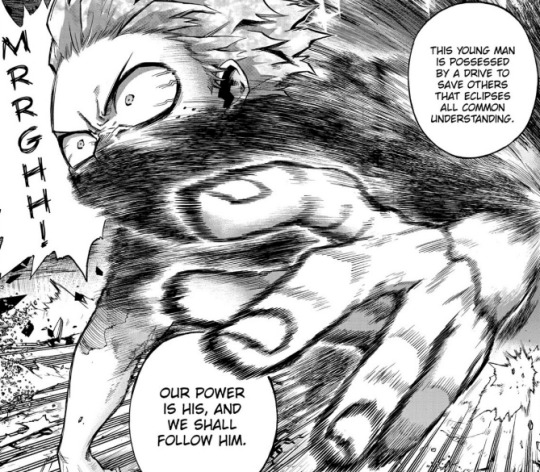
The story describes Deku as someone who is possessed by a drive to save others that eclipses all common understanding, but does the story give us any examples of that behavior?
Judai is characterized as a selfish, irresponsible child, and the story gives us countless examples of his immaturity and how it hurts others. Does the story of MHA do the same for Deku's purported virtues?
Let’s run through Deku’s actions, step by step, the actions themselves and how they are framed in order to find any evidence that Deku possesses this drive to save others. Does Deku reflect at all on the question of:
Can Shigaraki be Saved?
Deku leaves on a journey to try to understand villains. When he makes a perfunctory attempt to understand and empathize with Muscle, and Muscle replies that some people are just evil does Deku keep trying to reach his heart?
Nope, he just punches him.
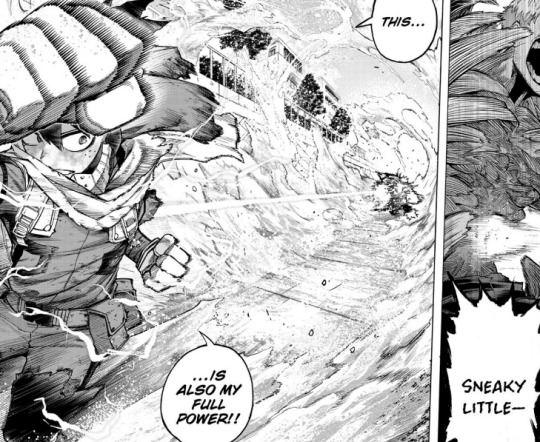
Well, if he’s failed in his goal of understanding a villain then does the story call him out on his failure? Does Deku face any sort of narrative consequence for that failure? Is he framed negatively for failing to understand Muscle, the same way that Judai is framed for abandoning Yubel?
Nope. Deku doesn’t express any frustration at all over is inability to reason with Muscle. There’s also no negative consequence for Deku just choosing to punch muscle, it turns out that there was no reasoning with Muscle and some people are just bad eggs so Deku was right.
It’s okay for characters to fail, but if a character fails and it’s not framed by the story as a failure then the writing itself as failed. Why even bother to include this scene in the first place if it doesn’t advance Deku’s character in any way? This scene in spite of showing Deku failing to understand someone actively paints Deku in a positive light, because of how much stronger he is ow that he can OHKO a guy that gave him trouble all the way back in the camp arc.
This scene doesn’t tell anything about Deku as a character, it just makes him look cool. In fact that’s precisely the problem, Deku isn’t adequately challenged as a character, because he’s never allowed to fail. Even when he does obviously fail at the things the narrative set out for him to do, he’s never challenged on those failures, because the priority isn’t to make Deku grow, it’s to make Deku look good.
As I said before, Judai is the hero because he’s the weakest. Deku is the hero because he’s the strongest.
Well, next a big flaw on Deku’s part is that he worshippd the same heroes that were making the world corrupt. Heroes like Endeavor who created people like Dabi. So, does Deku take action to either criticize the older generation of heroes, or separate himself from them in order to try to be better than them?
Nope, he teams up with them. Not only that, Deku can’t do something as simple as tell Gran Torino out loud about his plans to save Shigaraki. If Deku feels that Shigaraki is worthy of salvation then he should at least try to make an argument here about his ideal of saving others.
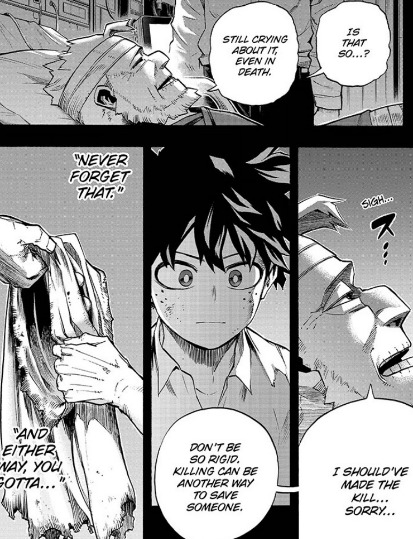
Now here’s the thing, if Deku hadn’t directly looked at the camera and told us he wanted to save Shgiaraki, would we be able to deduce his intentions from his actions? If you took away all of Deku’s internal monologue, and just showed him punching Muscular and saying nothing when Gran Torino says he may have no choice but to kill Shigaraki would anything about Deku’s actions indicate that he wants to save Shigaraki?
Let me use avatar the last airbender as a positive example for a moment. People say that Aang’s desire to spare Ozai’s life comes out of left field, but like if you analyze Aang as a character down to their bending, and the way they react in situations they always prefer de-escalation, or taking a third option as opposed to confronting things head on. It’s literally why Toph says Aang has trouble learning earth bending, because as an airbender, he always tries to look for some other way to solve the problem, instead of a direct confrontation with force. As early as season one, Aang tells Zuko someone who has tried to kill him several times that he was friends with someone from the fire nation one hundred years ago and in a different situation they could be friends.
Aang’s desire to save the Firelord may not have been told to us until the last possible minute, but Aang’s aversion to violence has always been a part of his character from the beginning. However, Deku never shows any similar aversion to violence. There’s basically no example where he ever tries to de-escalate a situation, or he avoids a conflict by seeking a third option.
Anyway, let’s move onto the next example. In the confrontation where Lady Nagant fights Deku, when Deku learns the fact that the heroes were employing government hitmen to attack people for uhh… exercising free speech does Deku give any reaction to this information?
When Lady Nagant says that Deku is only going to bring back the status quo, does he show her any meaningful evidence that he won’t do that.
Deku’s response is because the world is so grey, he needs to extend a helping hand to others. Which you know what thay could be a response. Deku saying that his response to the corruption of the hero world is that he now understands that society led some people down the wrong path, so his way of addressing the wrongs of that society is lending a helping hand to as many people as possible even people he used to think was irredeemable.
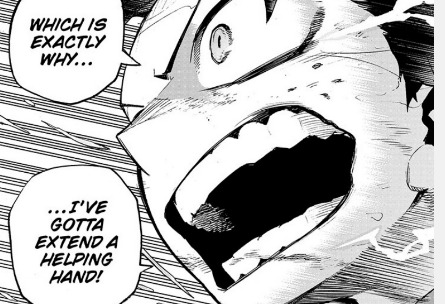
I will give Deku the benefit of the doubt, I think this is an acceptable answer. I can’t save everyone, but that’s not going to stop me from trying to save as many people as possible and maybe I can save people who were this society’s victims on the way too.
However, does Deku demonstrate his resolve to extend a helping hand in any meaningful way.
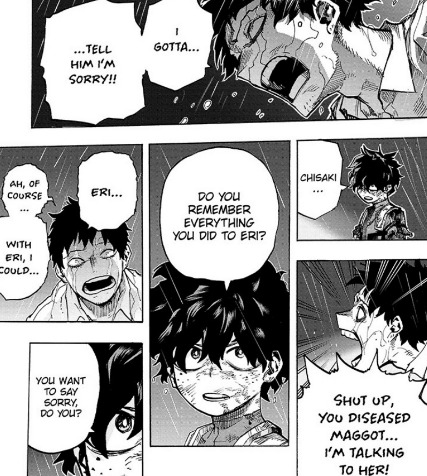
Deku is met with an armless, insane Overhaul who’s begging for someone to help heal his father figure in the Yakuza from his coma. This isn’t like Muscular who insists that there’s no helping him, Deku is met face by face with someone asking him for help. Deku’s gotta extend a helping arm whenever he can, because he knows some people were abandoned and led astray by this society…
Unless that person is someone he doesn’t like personally. At which point he only helps them on a conditional basis. We are told Deku will save anyone and everyone, but Deku is met face to face with an armless man who is begging for help and Deku’s does nothing to help him.
Deku’s not criticized for refusing to help overhaul either, it’s never brought up again.
When Deku begins to experience a mental breakdown because of all the people he’s trying to help in the Dark Deku arc, we are told this is the result of Deku trying to save everyone, but we do not see Deku attempting to save a single villain after Muscular and Nagant.
He exhausts himself beating up villains that AFO sends after him, and only helping innocent civilians. Which would be fine if this arc were about how Deku is running away from his real responsibilities the same way that Judai was running, but that’s not what we’re being told. We are told that this is all part of an arc of Deku learning to understand villains and be a hero.
Deku is asked “Can you save Shigaraki?” by the story, but Deku never at any point has to deliberate on that question. Judai doesn’t deliberate on that question either, but him choosing not to think about things and stay ignorant is the point.
It’s actually fine to make Deku stagnate as a character. It’s fine to have him take the easy way out by just punching villains and giving up on them after one conversation. It’s fine for him to be empathetic to other people’s suffering, or even self-righteous. It’s fine for him to be ignorant.
He could be all of those things if it was a part of a narrative teaching him to unlearn his behavior. In fact the narrative might have been better if Deku started out by saying he didn’t want to save Shigaraki, that there was no choice but to kill him, because then at least his actions would be consistent with his words. Then his lack of empathy and his tendency to resort to violently beating up villains instead of avoiding violence would be character flaws he could work on.
Deku however, is presented to us as this empathic hero who is always willing to give others a second chance though he never actually sticks his neck out in order to do so. Continuing on with our slow crawl through MHA, one of Deku’s friends is revealed as the traitor. Deku has a heartwarming scene fo saying that Aoyama can still be a hero, but look at his actions.
He lets the adults in the room physically tie Aoyama in a straightjacket and imprison him, for the crime of… doing bad things while he was in a hostage situation. Apparently, if a bank teller helps the bank robber by giving them money when the robber has a gun to his head, the swat team should just snipe the bank teller.
Not only does he not defend Aoyama against the adults, or stand up for him, or tell the adults they’re wrong to treat Aoyama a clear cut victim who had a gun to his head and was bing held hostage like he’s a villain - he also lets the adults use Aoyama an innocent victim as bait in order to lure out AFO. Deku tells Aoyama he can still be a hero, but he doesn’t defend Aoyama as a victim of being taken hostage, nor does he stop the adults from further taking advantage of him and throwing him right into danger. Some people are just led the wrong way that’s why they need to be extended a helping hand, but fuck Aoyama I guess. He needs to earn the right to be sympathized with by physically putting his life in danger.
Deku can’t even go out of his way to save a friend who he’s known for the better part of a year, when that friend is a complex victim forced to do bad things.
Then Deku and Uraraka have a conversation where they both, kind of ruminate on the idea that maybe the villains are human beings who are worthy of sympathy.
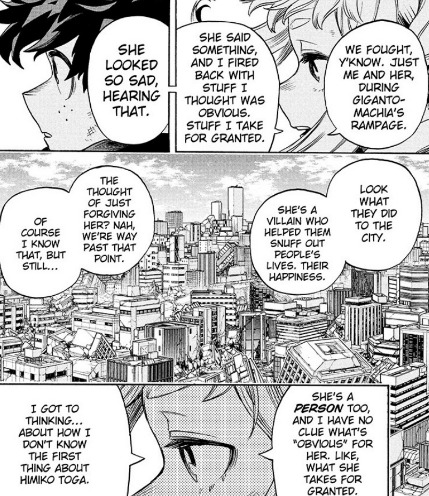
In fact Uraraka is actively trying to dehumanize Toga by looking at the destroyed city, so she won't have to think of Togaas a person.
The language here is also a major fault of this arc. It focuses far too hard on “forgiveness” over and over again. As I said before, saving Shigaraki isn’t about Shigaraki at all, it’s about Deku, and how he wants to use his power as a hero. Deku has even stated himself that he doesn’t believe that OFA is a power that should be used for killing people. So why does whether Toga or Shigaraki are forgivable or not even matter?
It’s the same with Deku refusing Overhaul any sympathy. If he’s so morally opposed to abusers, then why does he work with Endeavor and defend him at every visible opportunity, even in front of his victims?
Whether or not Deku can forgive Shigaraki doesn’t matter, because Deku is not the moral arbitrator or right and wrong. In fact Deku doesn’t even have any morals, so how is this a moral debate? Is there any point where Deku gives a clear definition of what he thinks right and wrong is? Does he quot Immanuel Kant to the audience?
Batman doesn’t kill people, not because he thinks that every last person on earth can be saved, but because Bruce Wayne an incredibly rich white man thinks that maybe he shouldn’t have the authority to decide who lives and who dies. When Bruce doesn’t kill the joker, it doesn’t mean he thinks the Jokers actions are forgivable, it’s because Bruce thinks it’s not his place to determine whether someone has the right to live.
The whole conflict that MHA presents us is that heroes pick and choose who to save, and only save the ones they deem as innocent. So, how does Deku saying repeatedly they can’t forgive Shigaraki contribute to that theme in any way?
In fact by focusing on forgiveness, rather than whether or not he personally has the right to pick and choose who lives and who dies Deku is ignoring the elephant in the room. The question isn’t about whether Shigaraki’s redeemable or if his deeds should ever be forgiven. The question is whether Deku has the right to decide who gets saved and who doesn’t.
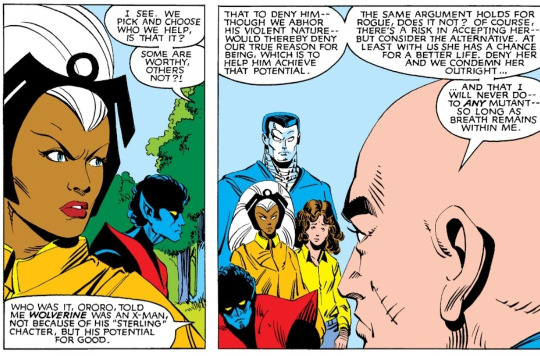
We are told that Deku as a character is someone who wants to save everyone no matter what, so Deku shouldn’t be focusing on whether or not Shigaraki is worthy of forgiveness, he should be making an idealistic argument like Xavier does in this panel. Why doesn’t Deku talk out loud with Uraraka on how he believes his power is for saving others, and not killing?
If he’s meant to represent some idealistic hero, then why doesn’t he even talk about his ideals? Why don’t I as the reader know what those ideals are?
I think Xavier’s ideals of forcing the X-men to provide a good example to the mutant community, in order to try to earn the respect of other human beings is wrong, but at least he has ideals.
He tries to inspire the other people around him to live up to those ideals. The story can criticize him for his ideals and point out how they’re wrong, while it can also uplift parts of his idelogy like where he believes there are no evil mutants. Deku has a chance to do the same to Uraraka, to tell her clearly, “I don’t think we as heroes have the right to pick and choose who we help…?” but he waffles. Not only does he waffle, but this moment is meant to be read as an indication that both Deku and Uraraka are sympathetic individuals who want to save their villains. They are supposed to look good and idealistic here and they don’t.
For Deku it just seems like a repeat of his behavior with Overhaul. The only villains that are worthy of sympathy, are the ones that he personally decides are forgivable.
The story isn’t about whether or not it’s moral to save someone who’s killed as many as Shigaraki has. The story never seriously discusses any sort of complex morality or moral philosophy. Once again to bring up avatar, yes you can argue Aang sparing the life of a war crimminal is bad, but Aang mentions on multiple occasions that he wants to retain the cultural values of the airbending people. Aang has a morality, a consistent morality, it might not be a morality you personally agree with but at least he has one.
Deku hates abusers, unless he’s next to Endeavor then he thinks abusers should be given the chance to atone. Deku doesn’t believe that One for All is a power for killing, but he never stands up to any of the adults who are blatantly trying to kill Shigaraki, he doesn’t even express out loud to Uraraka that he doesn’t think heroes have the right to decide who lives and who dies. In fact he’s given the perfect opportunity to, when Hawks kills a villain and it’s broadcast live on the news in font of everyone, but Deku never has anything to say about that.
The reason Deku and Uraraka both put such an emphasis on “forgiving” their villains has nothing to do with the story itself. It’s because the author Horikoshi, is afraid that some people will misinterpret his story as saying that he actually thinks that saving a villain like Shigaraki means that he condones mass murder, so he has to have the characters talk about not forgiving Shigaraki.
Judai doesn’t have any consistent morals either, but once again that’s the point and something the story relentlessly calls him out on.
Cobra: Fortune would never smile on a fool like you who fights while prattling on about enjoying duels.
Cobra: You are certainly a talented duelist. But you have one fatal flaw.
Judai: A fatal flaw?
Cobra: Yes, your duels are superficial. Someone who fights with nothing on his shoulders, cannot recover once he loses his enjoyment. What a duelist carries on his shoulders will become the power that supports him when he's up against the wall!
Cobra: But you have nothing like that! Those who go through life without anything like that cannot possibly seize victory.
Cobra: But I know that nothing I say will resonate with you... because you have nothing to lose but the match.
Judai: I...
Cobra: Afraid aren't you? Right now, you have nothing to support you.
Judai’s regularly called out for his superficiality. Judai is only a hero because he’s strong and wins fight, he doesn’t feel any responsibility towards other people, and in fact he loathes having to feel responsible for others. Judai isn’t just naive, he deliberately chooses to remain ignorant.
Since he’s ignorant of his own faults, he makes awful decisions when it comes time for him to lead, and his friends die because of choices he made.
We are told that Deku doesn’t want to remain ignorant, that he wants to understand villains, but Deku’s actual actions are him continuing to ignore society’s ills and the suffering of victims. In fact if you take away Deku’s internal monologue and the narration, Deku’s actions almost exactly mirror Judai’s.
Deku is just as superficial as Judai, and he also doesn't want to spend any time thinking about what kind of hero he wants to be, but the narrative never punishes him for it.
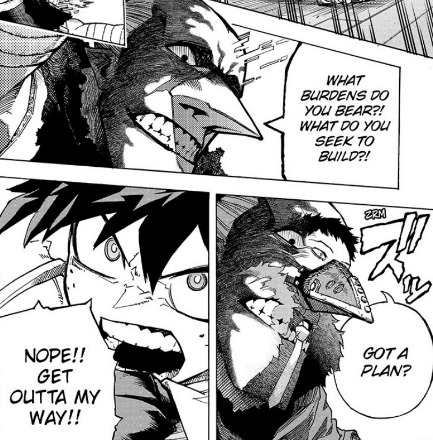
Judai is asked what burdens he has to bear and he has to meaningfull answer that question, Deku is allowed to get away with not having to think about anything. Deku remains superficial.
Both Judai and Deku spend the entire arc running away from their villain rather than confronting them in any meaningful way. They both never express out loud any sympathy for their villain, or try to empathize. THey both never step down from the role of hero, and only confront their villain as a hero, because they don’t want to think about themselves as complicit or in the wrong.
Shigaraki and Deku’s final confrontation mirrors Judai and Yubel’s but without the same clear framing. THe entire time Yubel is trying to get Judai to empathize with them, and Judai only responds with physical violence, because they don’t want to stop being the hero and because they can’t see Yubel as anything other than the villain.
As soon as Deku arrives on the battlefield (by the way everyone else and their mom pointed this out, but Deku who doesn’t think OFA is a power for killing, is completely okay with a plan called the “Sky coffin plan” where every other hero was clearly trying to murder Shigaraki).
When Deku arrives he asks if Shigaraki is still in there, but he doesn’t do anything to try to reach Shigaraki, he jumps right to punching him. In fact he never tries anything besides punching him as hard as possible.
How is punching Shigaraki with the force of a thousand suns saving him exactly?
How is that different from how he tried to defeat Shigaraki the last war arc, before he saw the image of the crying child that made him want to try a different approach in saving Shigaraki?
In Judai’s final fight with Yubel, it’s made explicitly clear that Judai is not trying to save Yubel, and that’s a fault on his part. In fact Judai gives the traditional “I have friends, and you don’t” speech to Yubel but it’s a subversion of how that speech is usually used.
Usually that speech is used to show that the protagonist won because of they valued friendship,while the villain treated their friends poorly and only cared about power. However, it’s ironic in this case because Judai got all of his friends killed. Judai treats his friends like garbage. This speech isn’t used to show that Judai is winning because he values his friends more than Yubel does, it shows that Judai is a hypocrite, playing the hero in this situation where they are just as bad as Yubel.
Judai’s not morally superior, he’s just lucky that he has good friends. Friends that were willing to save him. The only connection Yubel has to anyone else, Yubel’s only friend is Judai and Judai is a shit friend.
In fact, Mirio tries to give a version of the “You don’t have any friends” speech to Shigarkai, only for Shigaraki to get mad and tell Mirio that he does have friends and people he wants to protect.
This fact is also something that is blatantly ignored by Deku, even though Mirio tells him about it… even though we are told that Deku is trying his best to see the humanity in Shigaraki.
Judai blatantly admits they’re trying to kill Yubel. Which makes them a worse person, but a better character than Deku, because their actions are clearly framed by the narrative and consistent.
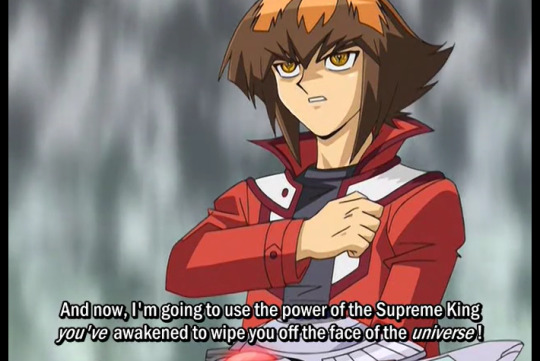
On the other hand we are told that Deku doesn’t want to kill Shigaraki, and yet everything Deku does makes it look like he’s just trying to kill Shigaraki and put him out of its misery. If we didn’t have Deku stating out loud that he wants to save Shigaraki and wants to see him as a human, there’d be nothing in his actions to indicate that he’s trying to avoid killing Shigaraki. Deku says he can’t pretend he didn’t see Shigaraki crying, but like, does he ever hesitate to punch Shigaraki, does he ever think that causing Shigaraki more harm is wrong when he’s already suffered so much?
Deku says that Shigaraki is a person but does he treat him like a person? Does he try to talk to him like a person?
To use avatar again, Aang does talk to Zuko pretty early on. Deku doesn’t even give the classic “We could have been friends under different circumstances” speech. When Shigaraki resists Deku’s attempts to see him as a person or emapthize with him, Deku’s response is to just resort to punching harder.
Which is in effect the same thing Judai does to Yubel, just kill them as a villain so they don’t hurt anybody else, but framed in an entirely different light. Judai is shown to be ruthless, and cold in his attempt to only settle the conflict with Yubel by violently putting them down. On the other hand we’re being told that Deku is compassionate and empathic while he punches Shigaraki with the force of a thousand suns.
There’s another eerie similarity between both of these final confrontations. At the climax of the confrontation, both Judai and Deku have a psychic vision where they see events from Yubel and Shigaraki’s childhood. This vision is supposed to help both characters understand the good in the villain they’re facing.
Let’s see the contents of this vision and how the visions change each character. Judai is shown a vision of his past life where Yubel sacrifices their entire body, and even their humanity to go through painful surgery to turn into an ugly dragon, all for the sake of protecting Judai in a previous life.
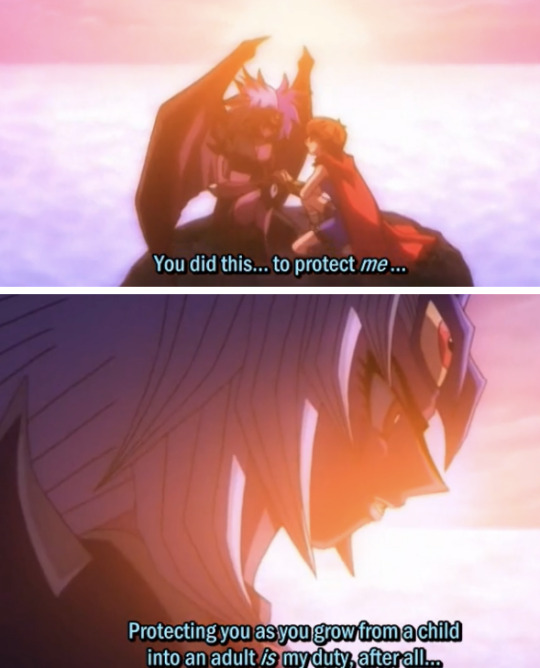
Judai is then forced to witness the good side of Yubel they’ve been ignoring all along to paint them as a villain. Yubel is simultaneously extremely selfish and willing to hurt people Judai cares about, but they’re also extremely selfless and will do anything to protect Judai and have made great sacrifices in the past for Judai’s sake.
Deku gives lip service to not ignoring the humanity in Shigaraki, but Judai is literally forced to acknowledge the humanity in Yubel. Not only that, but Judai changes his behavior immediately after learning this new information.
After seing the sacrifice that Yubel made for him in the past, Judai responds with a sacrifice of his own. A sacrifice that perfectly mirrors the sacrifice that Yubel once made for him. Yubel gave up their humanity for Judai, so Judai fuses his spirit to Yubel’s, becoming a human / spirit hybrid so Yubel no longer has to be alone.
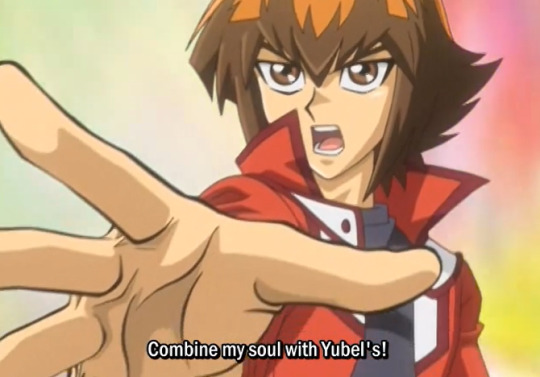
Judai also doesn’t just fuse their soul with Yubel’s in order to stop Yubel from destroying everything, it’s because both of them at this point need to atone together, and Judai is fulfilling his responsibility of watching over his friend until the end to prove that you care about them - as he said to Sho. Judai’s also fulfilling Johan’s dream of helping repair the bonds between spirits and humans, by reconciling with Yubel and repairing their bond. It’s also Judai atoning for his previous behavior of abandoning Yubel, by choosing to stay alongside them as they both atone together.
Deku does sacrifice OFA during the fight against Shigaraki, but their sacrifice isn’t to help Shigaraki, but rather doing psychic damage to Shigaraki by using OFA is the only way to defeat them. He transfers OFA in order to break Shigaraki’s brain so he’ll stop reissting and Deku can beat him down.
Judai fuses their soul together with Yubel out of empathy and a responsibility they feel to help their friend fater abandoning them, Deku transfers One for All to Shigaraki in order to hurt him and make him easier to punch. It's funny that Deku doesn't travel to Shigaraki's mind to learn more about him, but instead with the specific intent of harming him.
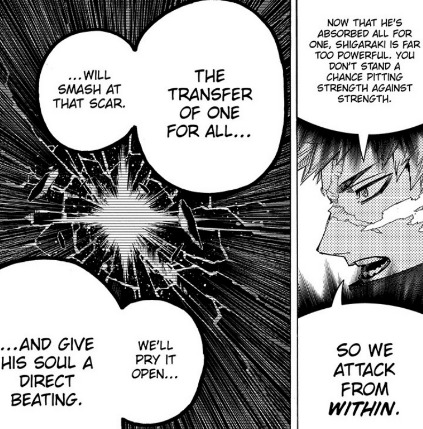
Once he's inside Shigaraki's mind, he doesn't take time to reflect on how Shigaraki used to stand up for bullied kids, or how he wants to be a hero to villains because no one else will stick up for the outcasts in society. No, he only care about Shigaraki when he takes the form of a child crying for help.
In the aftermath of the psychic vision Deku’s behavior doesn’t change towards Shigaraki in any way either. You could say he sacrificed his own arms in order to try to comfort Shigaraki within the depths of his own mind - but that’s not a real sacrifice either because his arms immediately come back.
When Judai learns about the sacrifice that Yubel made in a previous life towards him, he stops seeing Yubel as an enemy and finds a way to resolve things peacefully between them.
When Deku lanterns that Shigaraki’s a victim of All for One, and that his entire life was a lie, when he sees Shigaraki’s suffering first hand does his beavior twoards Shigaraki change in any way?
When he sees Afo has taken over Shigaraki’s body again, does he try to shout for Shigaraki, to tell Shigaraki to fight from the inside, to reassure Shigaraki that he’s still in there that there’s still good in him?
Nope. He just punches Shigaraki some more.
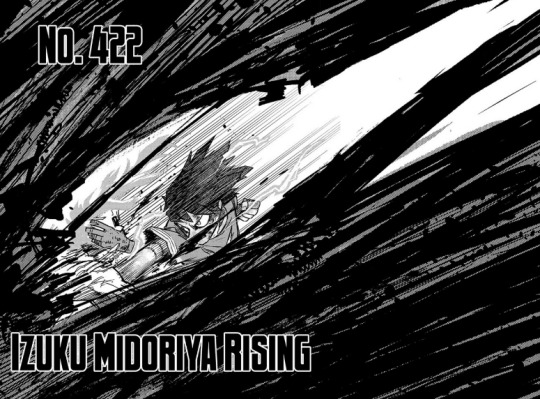
What Deku needed to tell Shigaraki is so obviously set up by the narrative too. Shigaraki wanted just one person in that house to tell him he could be a hero. Deku wanted his mother to tell him he could be a hero if he was quirkless.
Deku sees that Shigaraki started out as a boy who wanted to be a hero, and who was manipulated into being a villain but does he try to appeal to the boy inside of Shigaraki by telling him he can still be a hero? Does he now see the good in Shigaraki?
Nope, he just tries to kill him by punching him really hard.
I purposefully chose the images for the banner of this post, because it shows how differently MHA and GX treated its villains in the end. Yubel is embraced by Judai in the end, Shigaraki evaporates into dust.
"Judai, now that our souls have become one we will never be separated again. I have now been filled with your love and power. Let us fight together, against the wave of light leading this universe to destruction!"
Shigaraki could so easily have been given the love and empathy that Yubel was shown, but instead their life ends with no show of empathy from Deku, and with them dying believing that their long life of tragedy meant nothing in the end. Shigaraki realizes he's a crying kid, but he's never comforted.
Shigaraki: I only stole my body back from Master, and I didn't destroy anything. "In the end, I was just as you said... A crying kid, huh?"
Yubel is embraced and comforted, Shigaraki disintegrates into nothing.
One of these stories is apparently an optimistic story about heroes saving people, but it ends with the lifelong victim being killed in the most nihilistic manner possible, never receiving comfort, and never achieving anything with his long life.
The other story is a silly anime about card games, shows that when people are alone and suffering they can lash out and do terrible things. That all people are weak especially when they're alone, but the solution isn't to abandon them, or condemn them for their faults, but to believe in them and help uplift them the same way that Judai decides to uplift Yubel so they can atone together.
Which is why Deku gets an F in being a hero.
Go directly to summer school. Do not pass Go. Do not collect $100.
#mha meta#ygo meta#mha 423#bnha 423#mha 423 spoilers#bnha 423 spoilers#izuku midoriya#deku#shigaraki tomura#tenko shimura#judai yuki#yubel#soulshipping#yu gi oh gx#yu gi oh
683 notes
·
View notes
Note
Hello :o
I just wanted to say thank you (and also thank crumb) for getting me back into thinking about Karl Heisenberg 24/7.
I really love your artstyle, from the amazing expressions (especially the peeved/angry ones) to the scribbly lineart. As someone that’s trying to learn to draw more digitally, I really like to observe your stuff o.o
Your Moldy Family comics are funny, cozy, sweet and comforting all at the same time, and they made me discover and appreciate Eveline (oh man I love how much of a goth tween she is), and the way you draw Heisenberg (his physicality if that makes sense, his clothes, his hair, his everything) is just *chef’s kiss*.
As a former Greek Mythology child, that AU is so so nice owagh. I love all the monster adaptations/designs, it’s all so clever: I love that Kyril is scaley, hairy AND has wings (which I feel aren’t depicted often nowadays with gorgons), Alina is so majestic, with the black tipped limbs and the blood soaked dress, and the daughters being harpies/sirens(?) is also so perfect.
Idk if you’ve already said it, but what is it about Karl’s character that made him interesting to you?
I hope it makes sense (I’m a bit tired) and thank you again for the excellent food :]
Thank you so much!!!<<<3333
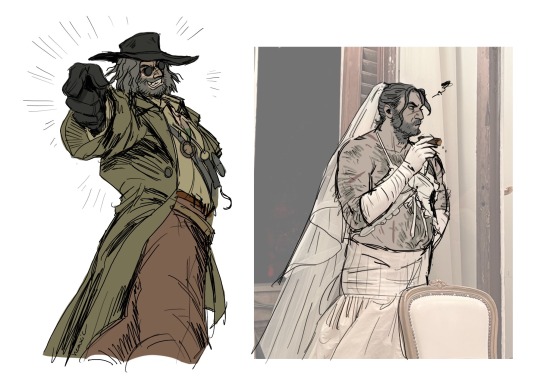
he lives in my head rent free…. his crusty-ass hair and barrel-shaped bod gets me every time
im glad you like my scribbly lineart! I tend to get concerned whether it really looks like anything haha
I miss drawing the mold family but i think my forte has always been fantasy, especially cause i love mythology more than anything. That’s not to say i wont go back to the modern mold family though
For greek au karl i wanted him to look like someone had haphazardly stuck animal parts to him so it’d look deliberately unnatural for him to have a relatively normal human body under all that-
I’m not sure i can fully describe why Karl is so interesting. Surface level, being voiced by Neil Newbon is always a big plus and his face model Joel Hicks is awesome-looking. His character design matches his abilities and personality really well, and speaking of personality, queer-coded villains who make a big show out of everything are always going to be my favourite. His gritty, masculine aesthetic is really inspiring in terms of gender as well. On a deeper level, in spite of all the terrible things he’s done, i find him sympathetic and relatable. After decades spent in a highly dysfunctional family, not living on his own terms, completely alone, I need him to finally be okay and get better for his own sake, with the support of people he trusts. It’s the same reason i love Eveline. Morally dark-grey characters who deserved better and could’ve gotten better with a good support system.
#thanks so much for asking!#i hope i answered well enough#im not really good at putting thoughts into words#ask#re8#re8 karl heisenberg#re8 heisenberg#fanart#my art#sketch
451 notes
·
View notes
Text
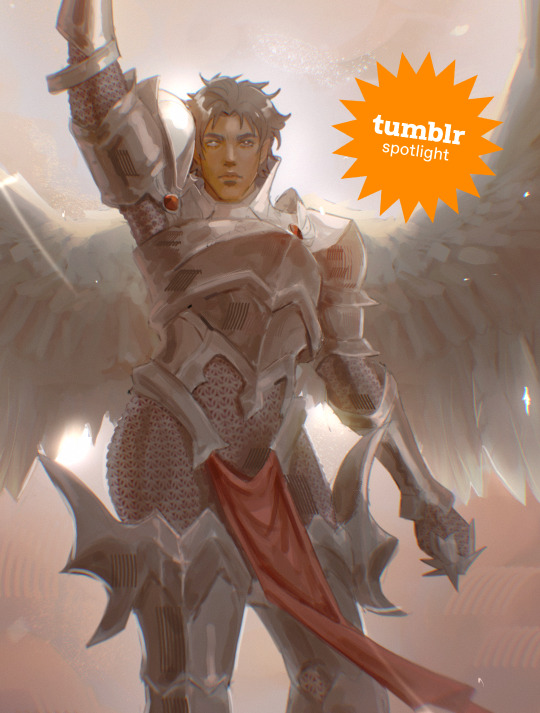
Creator Spotlight: @chaaistheanswer
Hi everyone! I am Clara, but you can also call me chaa! I am a digital artist based in Auckland, New Zealand, with a bachelor’s degree in Creative Media Production. After graduating from uni, I moved out to pursue my art career and I’ve been a freelance digital artist ever since. I love concept art, especially character design! Creating characters influenced by my love for fantasy is what I live for. Thank you for stopping by, and I hope you enjoyed my art!
And thank you, Tumblr, for this opportunity!
Check out our interview with Clara below!
Did you originally have a background in art? If not, how did you start?
I specialized in art in high school and have a bachelor’s degree in Creative Media Production from Massey University with an animation pathway. For our thesis film, which I worked on with several of my classmates, I took on the role of producer, art director, and concept artist. Our short film was featured in the Wellington Film Festival Terror-Fi in 2020. After graduating, I went on to become a freelance artist, but my goal is to work for the gaming industry as a character concept artist. Ever since I first picked up a pencil, I knew I wanted to become an artist!
Have you ever had an art block? If so, how did you overcome it?
Art block is quite common among artists, and unfortunately, I too have fallen prey to the affliction. I have several ways of overcoming art block: watching movies, playing games, reading, or going out for a drive with my sister. These are just a few things I love to do to help keep my creative juices flowing!
What is one habit you find yourself doing a lot as an artist?
I tend to obsessively research about completely unrelated topics while I draw. I find learning new things helps improve my concept designs, especially in creating backgrounds for my characters.
Over the years as an artist, what were your biggest inspirations behind your creativity?
Video games and anime were my biggest inspirations! Anything with a captivating story that’ll send me to the edge of my seat, and loveable characters. I’m particularly drawn to high and dark fantasy.
How has technology changed the way you approach your work?
Technology has made a huge impact on us artists over the last few years. I used to draw a lot on paper, but since getting a tablet, I find myself searching for the undo and redo buttons and even trying to zoom constantly while I draw on paper. I used to only draw for myself as well, but after posting my art online, I now have an audience to whom I can share my art. Because of this, I am able to earn a living doing what I love by creating illustrations for clients.
What is a recent creative project that you are proud of?
I am very proud of this recent commission I’ve done for a client! Fortunately, the piece turned out exactly how I wanted it to look, and my client was very happy with the result. I am also in the process of working on a Webtoon, which is going as smoothly as I hoped it would be before its re-release!
What advice would you give to younger you about making art that's personal or truthful to your own experiences?
The best advice I would give my younger self is to never hold back! Try not to think about the negatives of creating and sharing art that you believe in. Embrace vulnerability, and don’t be afraid to dig deep into your own emotions and experiences. Always explore, and don’t limit yourself to your own bubble. And most important of all, stay true to yourself! Stay true to your values and beliefs, and never compromise your own authenticity for the sake of pleasing others. Your art is a reflection of you as a person.
Who on Tumblr inspires you and why?
@yuumei-art has been an inspiration to me since my early Deviantart days. I admire how she uses her skills to focus on environmentalism and cyber activism.
@nipuni is another inspiration of mine. I found her when I was in the process of recovering from Dragon Age Solavellan hell. I admire how she manages to capture faces well while also sticking to her style. Her paintings are so beautiful and very pleasing to my eyes!
Thanks for stopping by, Clara! If you haven't seen her Meet the Artist piece, be sure to check it out here. For more of Clara's work, follow her Tumblr, @chaaistheanswer!
603 notes
·
View notes
Text
What WHB characters would wear in the human world: Gehenna
⟡ Masterlist ⟡
A/N: Very much inspired by the fact that demons in Obey Me have their own lil outfits while going to visit their favorite human ^^
༺☆༻

This short king is very much hot biker guy coded.
You know those tiktoks of guys who are showing off on the road and then do stupid shit at gas stations? That's this guy right here
He's not really a brand specific guy, but if you press him, he'll rave to you about MXDVS (honestly, same here ^^)
Darkwear/Techwear/Warcore
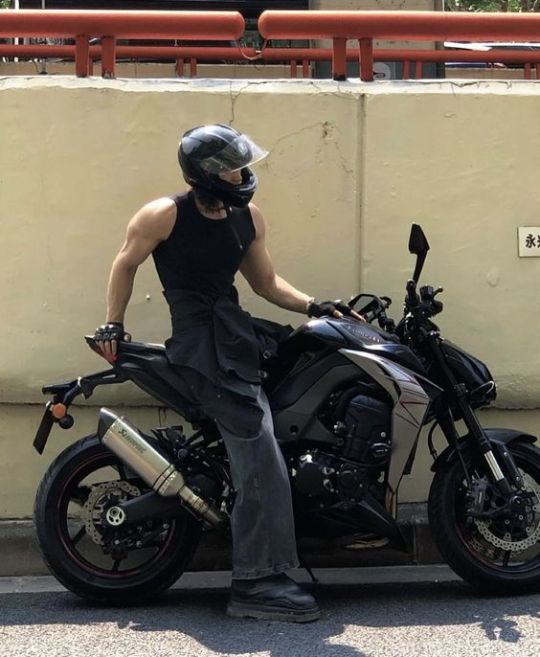
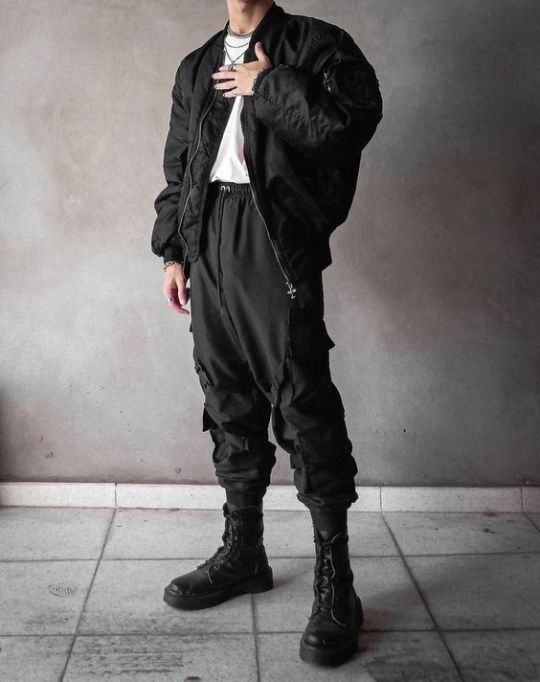
༺☆༻

Soft boi™
Light colors, nature, tea
Despite having his uniform altered to have black slutty shirt, he's very much cottagecore
He bakes, makes tea and cares for his fellow demons, need I say more?
Soft boy/Cottagecore
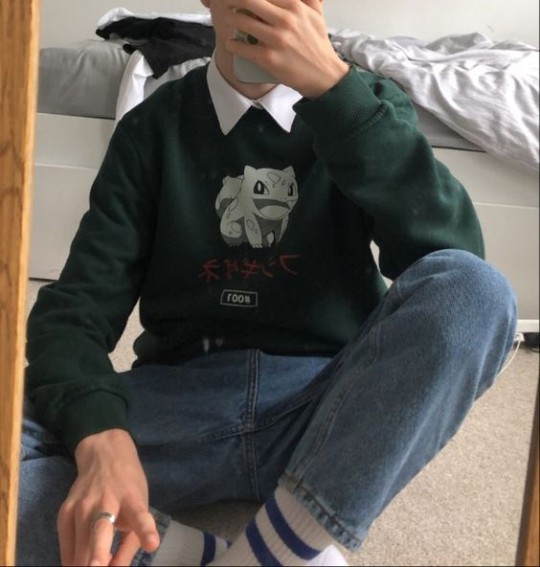
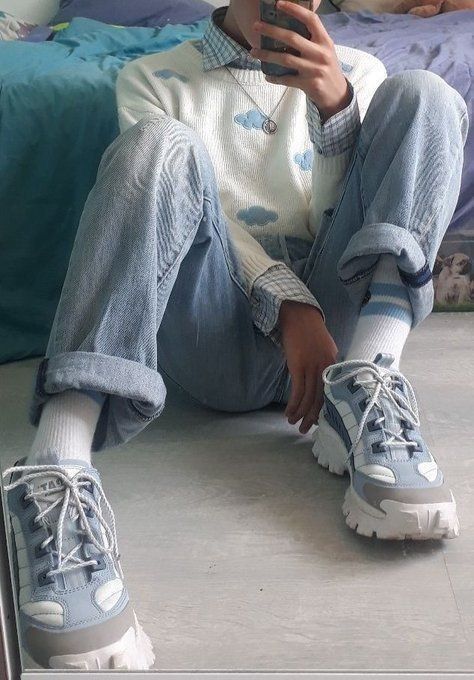
༺☆༻

V europian gay prince coded indeed
Dorian Gray kinnie
Open shirts all year around, only when it's cold/raining, he'll wear a coat over his shoulders
Vampirecore/Light academia
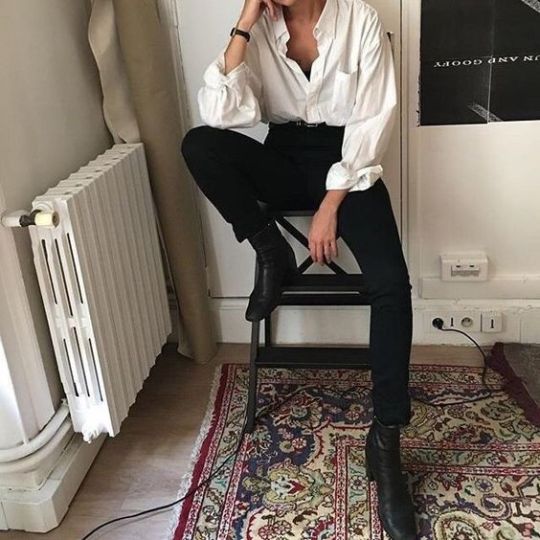
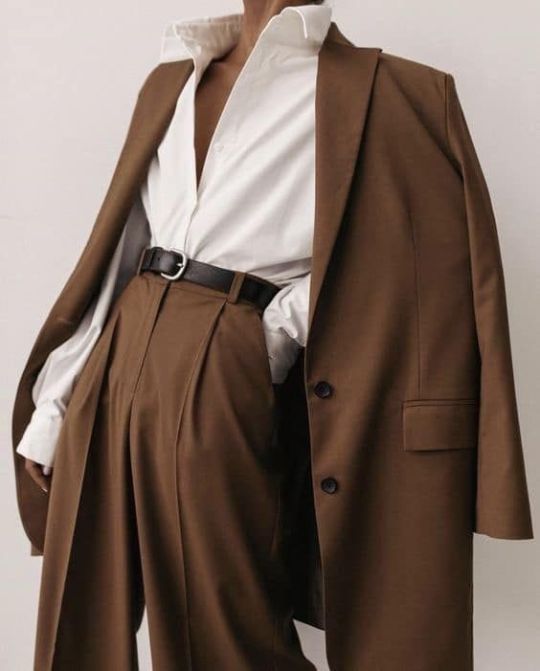
༺☆༻

Lose Paimon in the crowd any% speedrun IMPOSSIBLE challenge
The more colorful, the better
Gotta wear bright colors to match their bright personality
Indie/Kidcore/Harajuku
also pics credit to @/butterfliesworkforsatan on tiktok ^^
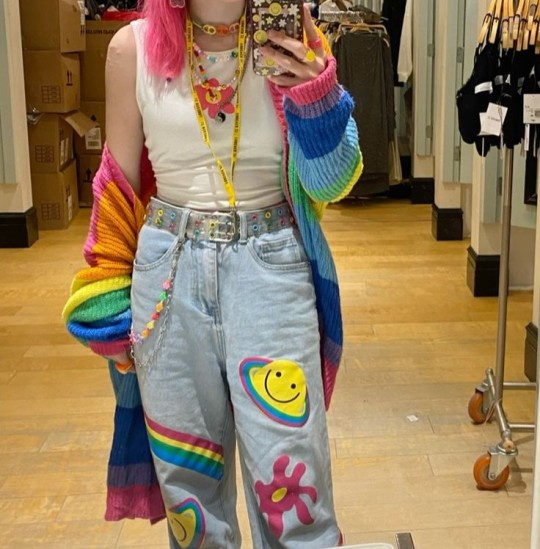
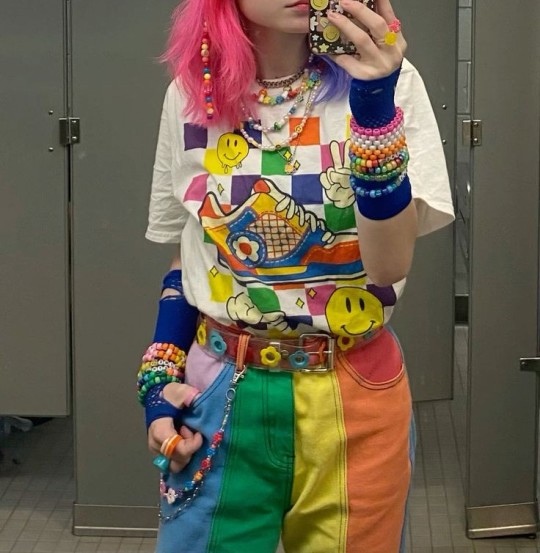
༺☆༻

Another dramatic ass fashionista
This time make it goth
You can't see it, but he's got eyliner on
What you see, however, is Jiyu wearing the same eyeliner
Vampirecore/Romantic Goth
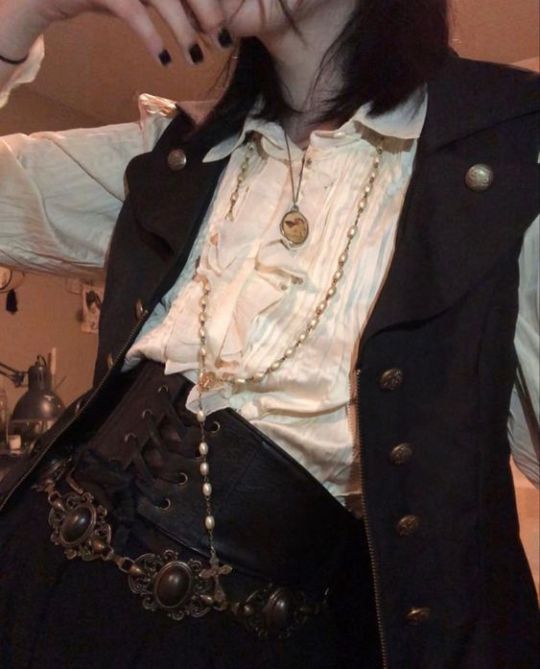
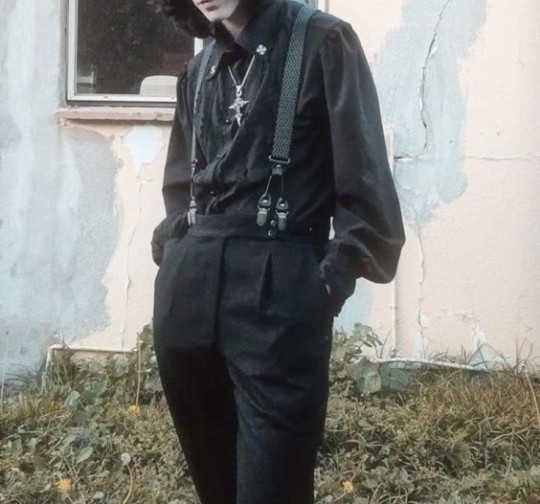
༺☆༻

Ooh he seducin' with more than his words allright
'Hey, my eyes are up here'
Sadly his snake has to be replaced by snake skin boots, but don'T worry, he snake is unharmed and chilling at home in Hell
Big Daddy vibes
Suits and trutlenecks
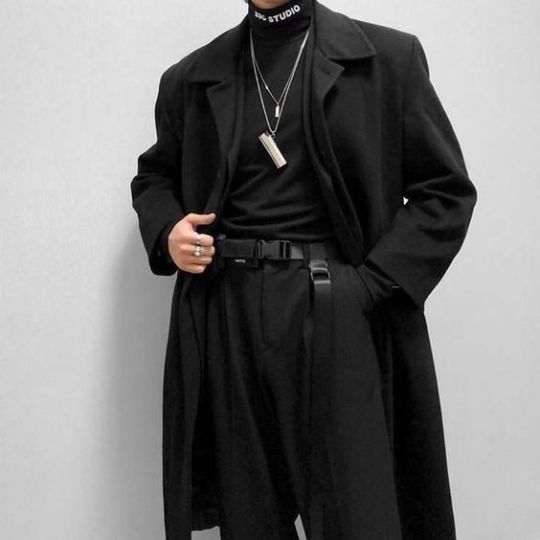
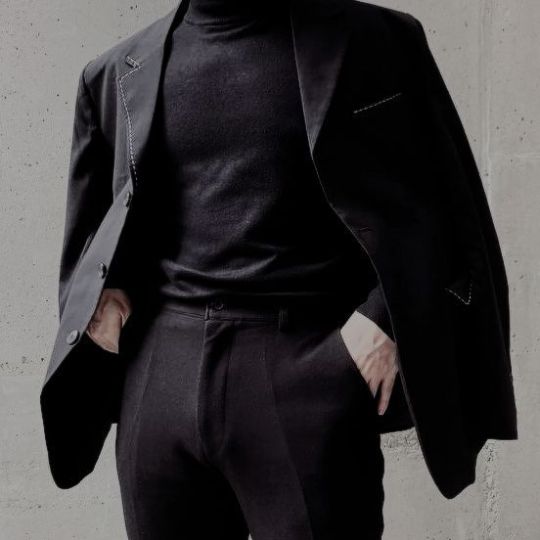
༺☆༻

Anything sporty, really
Likes wearing gray sweatpants bc he gets a lot of compliments
Thinks that grey is just his color
Don't ever tell him the real reason for the sake of u all
Also, maaaaaybee you could accdientally shrink his clothes in the wash so it's tighter on him?

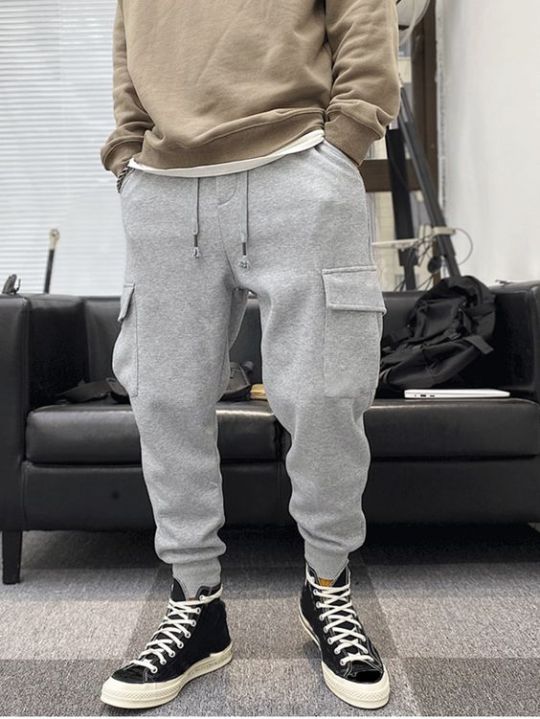
༺☆༻

Oh boy, good luck explaining to Juno, that he can't exactly be mostly naked outside or he'll draw too much unwanted attention
'But I've got this insanely hot body! Why should I hide it? Other's should be lucky to see me like that! I'm literally the hottest red lump in Hell!'
Cue in Juno trying to find things that are technically clothes that still show off his muscles
Damiano David ultimatelly becomes his fashion icon
Also Hatari
When this man discovers fishnets? Ooh boy
Good luck talking him out of just wearing full fishnet bodysuit
(and yes, it's hard to find pics that wouldn't get my post flagged by tumblr)
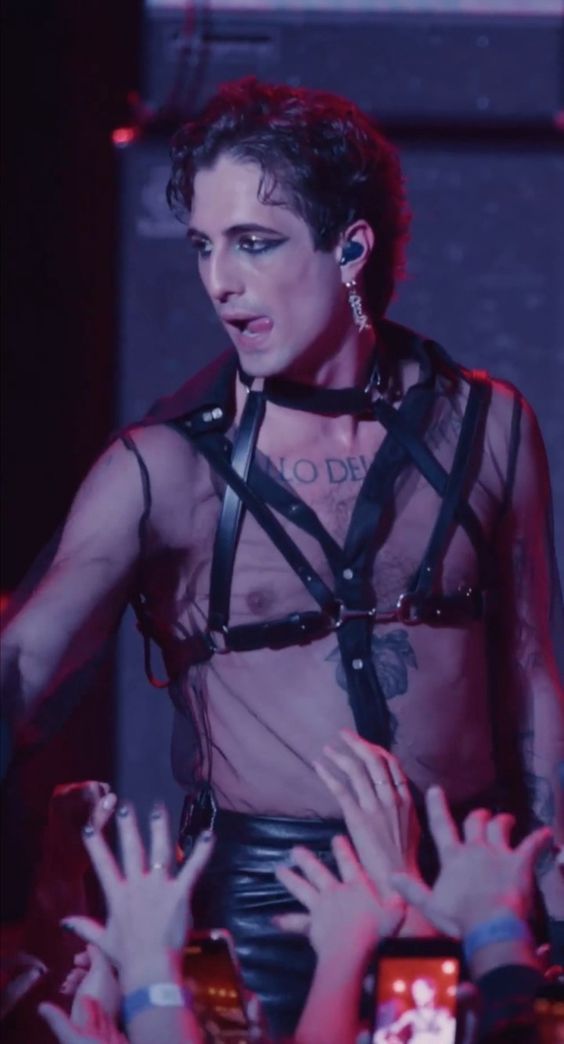
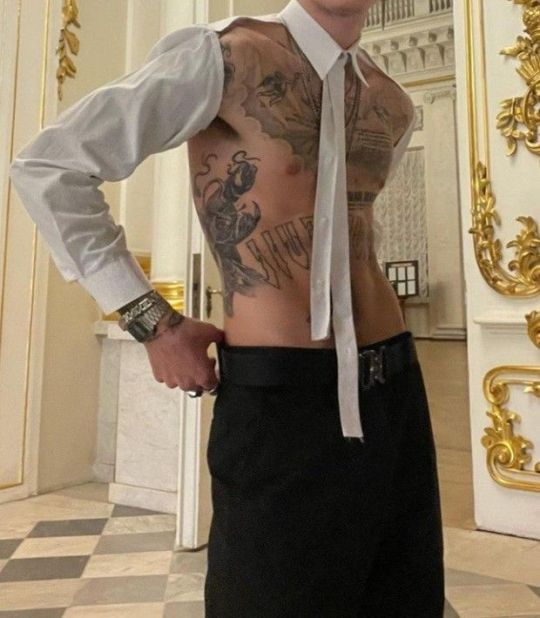
#what in hell is bad#what in “hell” is bad?#whb satan#whb sitri#whb leraye#whb paimon#whb belial#whb astaroth#whb zagan#whb juno#whb ppyong
245 notes
·
View notes
Note
hello! i’m love your post and arts so much! I look at your posts after a hard day and my mood immediately changes to excellent. can I ask a couple of questions?
which pairing with Ethan do you prefer?
and… can we get to know you better? a little biography?
Thank you for your time! I'll be waiting for new arts! (sorry if i made mistakes, my english is not so good. im russian)
i like basically every ship with ethan! it mostly depends on the mood im in, but if im being honest, mithan, winterfield, and wintersberg gets frustrating to think about because they all dont treat ethan well canonically... lethan is fun because they have never met and i can make my own assumptions!
i used to like wintersberg the most and i still do like it, i just have expanded my horizons to other ships as well...., its mostly like a punchline to me though. they have the funniest potential which is why a majority of their posts is just joke comics. i do not like how people try to erase how karl is arrogant and egotistical tho. thats like removing the flavor.... the way karl acts is just very funny to me, hes so lame in a good way and i like how everytime he talks to ethan it sounds like hes twirling his hair and kicking his feet. canonically speaking, karl was very much in the wrong for trying to use rose and not elaborating and i will die on this hill. ethan is not in the wrong for being disgusted and angry that karl would ever try and propose that in the deal. karl is very arrogant so when ethan says no to him it makes him mad and he tries to use fear to get ethan to take his deal (kicking his chair and warning him) i like karl, i like how messed up and arrogant he is but i dislike how people try to portray him as a nice guy. however, in a AU where everythings the same except he doesnt try to use rose i do enjoy the dynamic they could have, especially if the teamed up (not with the deal where they use rose. ethan wouldnt agree unless karl never involved rose in the first place). karl is just a very entertaining character and i like him a lot, hes funny and his personality can be extremely hilarious
mia and ethan is pretty tragic and thinking about it too much makes me a bit sad, imo in a reality where ethan survives re8, he needs to divorce mia. im not saying ethan needs to hate mia and never talk to her again i just dont think they should be so intimate together because of her behavior... please do not take this as anti mia. they loved each other dearly but it wasnt healthy. their relationship was kept afloat by lies and mia doesnt change even though she deals with the consequences of her own actions in re7. she actively tries to hide her past from ethan and is mostly focused on trying to move on and have a normal life even if ethan will have to live the rest of his life in the dark.
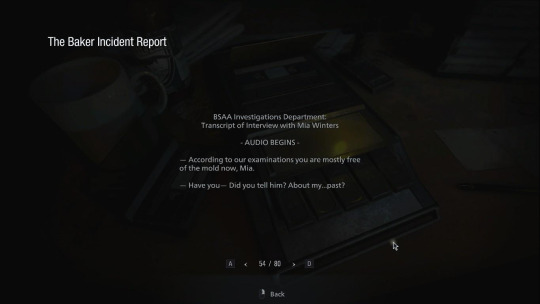
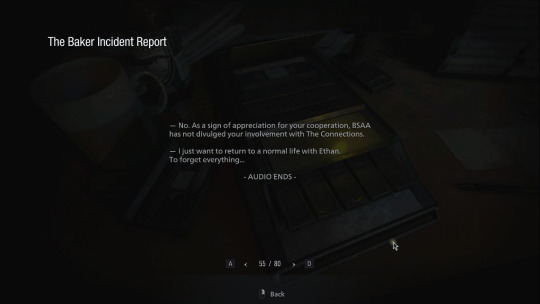
she loves her family so much, shes very afraid of them leaving her so she hides all the bad things in the hopes that they wont leave. its selfish, its human, its real, her character is so amazing and i love her. she doesnt learn from re7 and hides important information from ethan again. i geniunly think they should have gotten divorced after re8 if ethan had survived. its tragic and its sad but they love each other so much. it sad because they both geniunly love rose so much but they themselves shouldnt be together. its just sad to think about it. whenever i draw them it usually takes place before re7. they should have divorced on good terms and shared custody of rose.........
ethan and chris is also frustrating to think about... chris is a major jerk in re8, whenever i draw it, its under a unspoken AU that chris did not behave the way he did in re8. his weird behavior in re8 is probably for a meta reason imo. capcom wanted to set up a twist villian so they make chris very vague and unesscarily cruel. while its frustrating that they turned chris into a jerk for the sake of a twist, it still happens in canon and i will forever roll my eyes whenever i see him on screen. he did what he thought was best but imo, execution matters more than the intentions. same applies to mia. they both did things that hurt ethan because they thought it would be the best but in the end they just hurt ethan.
all the ships ive discussed with people ethan has met canonically just makes it look like i dont even like the ships... LOL ... ethan just has horrible luck with the people he meets i guess... but i do enjoy the ships and drawing them, but again all of them come with the canon baggage that ends up making me sad because everyone treats ethan poorly whether they had good intentions or not
which is why leon and ethan is the most fun to draw without getting stressed... LOL... they have never met but just drawing what i think their dynamic would be like is very fun.
please dont take this post personally, this isnt a post declaring why ur fave ship sucks, this is just my own personal preferences and in the end i draw all of them anyways
if i had to rank the ships based on drawing silly comics it would be
wintersberg
mithan
lethan
winterfield
wintersberg has the funniest potential just because of karl and mithan can be funny if u water it down to "i love my wife so much" and said wife comes home with suspicious amounts of hard cash
i enjoy making joke comics far to much
if i were to rank the ships based on how healthy they would actually be for ethan it would be
lethan
winterfield, mithan, wintersberg (no particular order)
sorry 😭
leon and ethan have literally never met but imo it would still be the healthiest because ethan gets to start new
the three other ships r all unhealthy in some way, at least canonically without changing much about the characters (i do like winterfield but just because of how chris behaved in re8 it knocked them down)
i cant even rank them on personal preference because my opinion changes so often 😭 it changes based on discussions i have with my friends or recent art i see that inspires me... me and my friends recently had a discussion about mia and ethans relationship which made me very frustrated and sad with mia so i defiently wouldnt be drawing them anytime soon... meanwhile i hvae been talking to a friend who really likes winterfield often so the conversations we have give me art ideas and i end up drawing it more. if a friend of mine really enjoyed wintersberg or lethan and talked to me about it often id probably start drawing it more, the joys of being a multishipper
it changes a lot based on how im feeling and if im in the mood to draw something funny or something serious
sorry u asked a really simple question and i responded with a essay
and a little bit about myself is that i go by crumb, i am 18 and i go by all pronouns and prefer it/its
im vietnamese and live in texas
i made this tumblr acc solely so i could post my ethan art and im a re7/re8 girly so if ur here waiting for me to draw the re1-re6 characters im sorry u should probably expect nothing
i also make personal animations sometimes which u can find here
thanks for the ask and sorry for the rant!
457 notes
·
View notes
Text
This is a sort of response to a post I've seen floating around, drawing parallels between the chains in Blitz’s trip that bind him to Stolas and the chains that bind Husk, Angel, and Fizz to Alastor, Valentino, and Mammon respectively. I'm not commenting on that post directly bc I avoid Discourse (tm) at all costs for the sake of my health, and I don’t want to get drawn into an unproductive argument that will mess with my anxiety for a week. I'm not trying to start a fight, just get my thoughts out on why I feel that comparison is inaccurate, and hopefully provide some helpful context and nuance.
So! Let's start with a few disclaimers! First of all, I'm not going to debate the moral purity of any of these characters. I just don't think it's an interesting or valuable critique. On a related note, I am not trying to excuse any of their behavior. I'm happy to admit that my favorite characters in this show have hurt people and are sometimes total assholes. Stolas treated Blitz very poorly at the beginning of their relationship, frequently pushed or even ignored boundaries, and was just kind of a dick about things. My objection to a direct comparison between Stolas and the other characters mentioned above isn't because I think Stolas hasn't done anything wrong; I just think that saying they're similar without further clarification or commentary ignores the nuance of the situation.
Read on below the cut, it's gonna be another long one folks!
Let's start by examining the "agreements" forged by Val, Mammon, and Alastor. I think it's important to note that, in their cases, the person they got to sign their contract could have been anyone. Husk and Angel could have been any sinners, Fizz could have been any imp. They aren't interested in them as people; they were only using them to gain more power for themselves. The only thing that matters to them is, "What can you do for me?" Angel and Fizz quite clearly become cogs in the machine of Val and Mammon's businesses, and Alastor only thinks of Husk as a tool to be leveraged in specific situations to further his own mysterious goals. Each of them has demonstrated to their subjugates that they own them, body and soul. They have signed legally and spiritually binding contracts that essentially surrender their autonomy to a more powerful demon.
Stolas and Blitz’s agreement is... not that. In the most literal sense, they don’t appear to have made any sort of binding deal. They just made a verbal agreement, which I sincerely doubt has anywhere near the force of a signed soul contract. Additionally, Stolas did not ask for and does not seem to want that sort of total control over Blitz. He very clearly does not view this as any sort of power exchange (which may actually be part of the issue, since it leaves him blind to Blitz’s discomfort with their class difference), he sees it as "favors for favors." While this agreement is inherently unbalanced due to Stolas's status, it's worth noting that they’re both putting something on the line here. The other three risk practically nothing (if the person bound to them fails they can always get a new one), but Stolas IS taking on a real risk by letting Blitz access the living world illegally using his book. Again, that doesn't make his actions right, and probably helped him to justify them, but it does set their relationship apart from the others.
In my opinion, some of Stolas's greatest flaws are his thoughtlessness and his ability to justify his own actions to himself. This manifests in the fact that he clearly doesn't see the ways in which their relationship is hurting Blitz. He convinced himself that this was just an equal exchange, and a continuation of the dynamic Blitz established in their first encounter as adults: "I fuck you, and you give me the book". As he becomes more aware of his feelings for Blitz, though (stay tuned for a deeper analysis of this progression later), he also begins to realize that Blitz isn't happy with this relationship. And this, as @masonshmason pointed out, is the central fact that separates Stolas and Blitz from the other relationships. Stolas did not realize- or chose to ignore- how he was hurting Blitz. Once he came to terms with it, though, he understood that he had to make things right. He specifically says this in "Just Look My Way"; "I will try to make amends/ For making you means to an end". None of the others could say this, because in their case, that was the POINT. Angel, Fizz, and Husk were ALWAYS a means to an end, intentionally trapped for that purpose.
We also need to talk about the CONTEXT of the scenes in which the chain imagery appears. For both Angel and Husk, the chain is at least semi-literal, a physical (and perhaps supernatural) manifestation of the way their souls are bound to an overlord. In "Two Minutes Notice," Fizz purposely CHOOSES to represent his relationship to Mammon as chains around his wrists. However, Blitz's scene is part of a drug trip after being forcibly dosed with hallucinogens. It does not exist in any literal sense, nor is it a representation of Blitz’s conscious, literal thoughts. What it DOES do is showcase Blitz’s deepest fears and his greatest flaws through symbolism and metaphor. Blitz is not literally afraid of being forced to wear a clown costume; he is afraid he'll never escape his past traumas or Fizz's shadow. THIS is the context in which Blitz sees himself being chained by Stolas: a bad trip all about his fear of intimacy and vulnerability.
Stolas appears in this trip as someone elevated high above him, something he's climbing towards, reaching for, even though it means being chained to him. It's directly preceded by his ex girlfriend and his former best friend berating him for how he pushes people away even though he hates being alone. Then Stolas directly asks him, "Are you afraid to love people, Blitzy?" Furthermore, the WAY in which he is framed is alluring, slightly hazy, golden and tempting. It couldn’t be further from the ugly, slime-covered past he's fleeing. It's a new start, a chance for something better that seems too good to be true. This trip is all about Blitz’s inability to be vulnerable with another person. The chain around his neck is a representation of the fact that, by getting closer to Stolas, he's giving Stolas the power to hurt him emotionally.
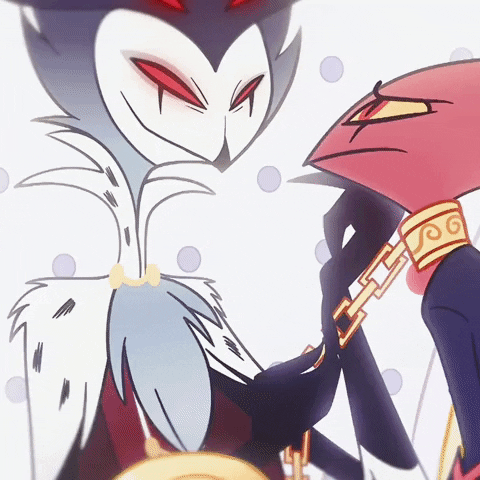
And man, there's a part of him that wants to give Stolas that power. At this critical moment, he's not baring his teeth in defiance or anger. He's blushing, just slightly, and he looks... nervous. Blitz's instinct, when things get too real, is to cut and run. Hurt them before they can hurt you. Abandon them before they have the chance to leave you. It’s how he tanked his relationship with Verosika. This is a manifestation of what might happen if he stays. This is the sort of trouble he can't fight his way out of.
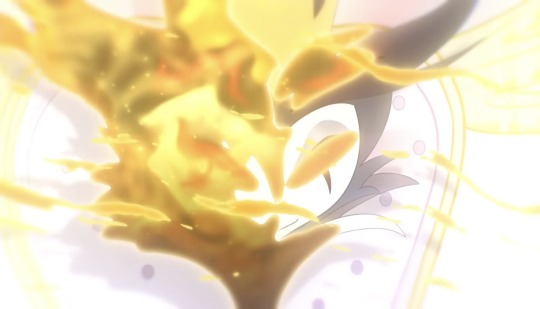
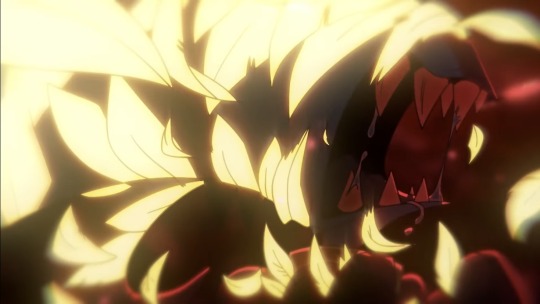
This is the emotional climax of the scene. There are so many ways they could have gone with this if they wanted to represent Blitz being chained and trapped by his agreement with Stolas. If that was the fear--if that was the POINT--they could have had the chains wrap around him until he couldn't move, or glow white hot and burn into his skin, or a million other more direct metaphors. But the chains aren't the thing that hurts him. It's the feathers: the thing that's left behind after Stolas abandons him, sing-songing "you're going to die alone" right alongside two other people who he loved and who now want nothing to do with him.
Finally, let's look at Blitz’s reaction to this scene. It's a moment of revelation for him, in which he realizes he's pushing everyone away and starts to make an effort to change. It's why he's a bit more open with Moxxie in the next scene. The trip sequence ALSO inspires him to get closer to Stolas, indicating that the trip didn’t make him realize "I'm trapped and I need to get out of this" in the same way Fizz did. Rather, he realizes that he doesn't want Stolas to leave him like everyone else, and he wants to start feeling out what it would be like to deepen the connection between them. As I've mentioned in other posts, their kiss at the end of "truth seekers" represents a level of intimacy that we haven't seen before; it's teasing, affectionate, shows Blitz’s interest in making Stolas happy, and takes place in front of M&M, who have repeatedly teased him about their relationship before.
In summary, while the image of chains may have been invoked in all four of these relationships, they don’t necessarily mean the same thing across the board. Blitz and Stolas's relationship differs substantially from the others in its dynamic, and the context of their scene also sets it apart. It's important to look into the details and the nuance of their relationship to interpret what's going on under layers of trauma and unreliable narration.
216 notes
·
View notes
Text
☆━━━━━ ⋆⁺。˚⋆˙‧₊☾ ◯ ☽₊‧˙⋆˚。⁺⋆ ━━━━━━☆
✩ ‧₊˚ ⌞ OUTFIT & DESIGN MOTIFS ⌝

sampo analysis m.list
— what the stars reveal: half-character-study, half-analysis, waxing poetic, elation!sampo
— word count: 3.1k
— overview: (as of 2.2) a look at sampo’s outfit and design, as well as how it may link to an identity closely connected with the elation.
☆━━━━━ ⋆⁺。˚⋆˙‧₊☾ ◯ ☽₊‧˙⋆˚。⁺⋆ ━━━━━━☆
For the sake of my own sanity, I’ll be splitting this analysis into clear-cut sections:
Snake Motifs
Binding Chains
Weapon
Hair
Color Palette
Shoes & Walking
Layers
Exposed Skin
Here’s his splash art for reference, although I’ll also be including other photos of his outfit:

✩ ‧₊˚ ⌞ SNAKE MOTIFS ⌝


One of the biggest aspects of Sampo’s outfit design are the snake bones littered across his clothing. From the scaled chain behind him to the shoulder guard that has a protrusion reminiscent of venom-dipped fangs, there is a lot of snake imagery present. Not just snake, however, but dead snake. It’s important to note that none of these pieces have skin or lively color — they’re all bones, bleached and picked clean. For me, this implies Sampo to be a skeleton character, a whisper of a dead or dying thing that still carries a last bit of venom in its fangs. Whether that “thing” is a metaphorical emotional state (centering themes of disillusionment and fatigue), a literal identity (centering themes of lessening power and lowering status), or a combination of both is up for interpretation. Either way, something inside him is decaying.
The snake — the living, hunting predator — is past its prime, stripping away over the years into something that barely resembles itself, the bones of an ancient and powerful thing. Emanator!Sampo may find himself slowly drawing away from the compulsive Elation first bestowed upon him, while Aha!Sampo may find Themself rotting into Their own mortal shell, the remains of what used to be a superficial avatar sticking to Their bones and sucking them clean; alternatively, the restrictions placed upon this mortal form of Sampo may cause Aha to be whittled down, only an echo of Their full strength. In another case, the silhouette behind the masks, the bones behind the meat, may have found himself steadily falling out of orbit with his larger mind, eventually ending up as nothing but a shadow of his former power as an Aeon — a skeleton, removed from the body when it was no longer needed. Or, perhaps, he is trying to keep the venom in.
(Note: His eyes are also snake-shaped like Baizhu’s from Genshin Impact!)


✩ ‧₊˚ ⌞ BINDING CHAINS ⌝
When looking at Sampo in a 360-degree view through the camera, something became apparent to me — the snake motifs (the spine and scales especially) seem to wrap around him tightly. In the splash art, this is a little difficult to tell (as the spine is flared out behind him), but here, they are tightly wrapped around multiple parts of his body:

Here, we see a fairly small part — a cuff wrapped around his upper forearm. This sticks out to me because it seems similar to a handcuff, or some kind of article of containment. It fits snugly, pressing in on his skin. There is also a similar wrapping around his thigh, showing that this is not a one-off design decision. There are multiple tight wrappings of containment around his body, which then implies a something in containment. Additionally, there’s the bone chains on his back:



They wrap around to the front, resting in the hollow of his neck. There are also two latches fastened to his back, giving the idea of the bones almost “hugging” him. Now, we are beginning to get a dual picture: a snake, slowly choking and constricting its prey, and a binding chain of bones, something meant to keep danger contained. We can see this even more clearly once the full picture comes together from different angles:

(These wrappings are even reminiscent of the symbol for Ouroboros, an ancient Gnostic and Alchemical symbol that represents the constant cycle of life, death, and rebirth, as well as the unity of all things material and spiritual. As I’ll discuss in its own dedicated analysis, this presence of the snake as a symbol of rebirth and unity may speak to a constant cycle of different emotions or consciousnesses within him — a loop he seemingly can’t escape. He is trying to live, but death ever looms in the background. Additionally, this points towards him trying to reconcile multiple facets of his being.)


The snake does not want to leave. It is cloying, constricting, containing at every waking moment, unwilling to relinquish the meat inside it. I believe the snake and the chains are one and the same: at the same time Sampo is being hurt and constricted, he is also being contained. The snake bones may represent Aha as a separate entity, the Elation as a addiction-filled Path, self-imposed rules from a more powerful past self, or even the “restrictions” placed on higher beings by virtue of existence.
An Emanator!Sampo may be constantly choked by the chains of his status, the realization that this Path isn’t the one he wants — disillusionment is hard to hold on to when surrounded by those who move from sorrow to joy at the drop of a hat. The gaze of an Aeon may constantly weigh on his shoulders like venom-tipped fangs waiting to strike, waiting to strip everything away from him once he becomes no longer “interesting.” Or perhaps that interest is the binding itself, the consuming, compulsive need to laugh, to operate on impulse, to push all feelings of doubt out before they can even be felt; the want to so desperately escape from Elation despite it clinging to him like a specter, regardless of his wants or needs. Emanator!Sampo may also be contained in his power, the same disillusionment that drives him to stray forcing him to hold back his true power, the truth that he could ruin everything he cares for with a single mistake. He doesn’t know what to do when the Elation grows ever tighter, ever higher, the bones of a rotting thing turning him rotten as well. He wants to escape but doesn’t know how.
(Perhaps, this desperation has rotted into hate which has rotted into vengeance, a dedication to using his life to push out the last of his venom, if only to stain an Aeon with Their own blood before falling away.)
Alternatively, an Aha!Sampo may find Themself now restricted by flesh and blood, feeling Themself to be a shadow, a dead skeleton of what They once were. For whatever reason, Their mortal form is forced to have restrictions, perhaps the same ones They face in Aeonic form. But it’s small. Too small. Ten thousand sizes too small, as it always is, and now They’re trapped for a longer time, forced by a looming threat to operate in the shadows, slowly hollowing out with the distance of consciousness and time.
Who are They, if not the masks? Who are They, if not an Aeon? Perhaps this is not even mask-related at all, but rather a silhouette who grew tired, determined to carve his own path when the stench of decay became too much. The Original, The Progenitor, far outlasted by feelings that grew too strong for his body to handle. He is not an Aeon, not a mortal, but somewhere between a bleached skull and a mouth full of venom. How can he spit out what is rightfully inside him? How can he cut the binds that tie him to an eldritch being he was never meant to be?
He does not want Elation, but Elation has always wanted him. How can he escape something so dedicated to swallowing him whole? How can he escape something so natural to his being? There is no clear answer besides one: if he does not find a way to escape, the only thing left of him will be bone.
✩ ‧₊˚ ⌞ WEAPON ⌝
Anyway! Haha! Isn’t he so silly? Let’s look at his weapon next:

It seems to continue the snake theme, with both sides of the blades marked with the same bright purple of the “fangs” on his shoulder guard. I don’t think it’s a mistake that these are the brightest colors of the outfit, but I’ll save that for later. For now, let’s focus on the dual nature of his weapon. Besides carrying on the snake theme, these are dual blades, able to be split apart and combined at a moment’s notice. To me, this seems like an indication of two “sides” to Sampo, two different personas that can be separated, combined, or interchanged at will. This could be an Emanator form, an Aeonic form, or simply another personality or “deeper” emotion behind the con-man persona.
I find this choice of weapon very fitting for him, as it capitalizes on the dexterity of both his personality and fighting style. It’s something that is easily able to be tossed from a distance, allowing him to damage enemies over time without getting too close to danger. There is also an inversion to its form, and while that could just be so he doesn’t scratch himself when throwing it, I also see its connection to the “inversion” of Sampo’s E6 and Aha’s splash art silhouette. There is an implication of inversion, mirroring, and duality with this weapon. Whatever power or consciousness he may be holding, there’s a good chance there are multiple dimensions to it, the kind of dimensions that exceed mortal standards.
✩ ‧₊˚ ⌞ HAIR ⌝
Something of note is the grey in his hair, a color often attributed to older and more powerful characters (Welt has a (albeit dyed) strand of grey hair and Acheron has grey strands as well). They are, however, at the bottom of his hair, like the (perhaps also dyed?) blue is trying to override it. This could speak to an attempt to find his own identity, to cast aside the bleached white of decaying bones and find some vibrance to live for. There’s also a lot of it compared to other characters. It’s not just one or two strands, it’s entire parts of his hairtips, with the implication even more may be white behind the blue. This would line up with what he says about being an “old timer,” most likely downplaying his own status to “just an old guy” when he is vastly more powerful than others realize.

Additionally, his hair obscures one of his eyes, always casting half of his face behind blue.
I feel this speaks to the idea of “multiple” sides, since one part of him is literally hidden from view. There’s the laughing, joking con-man we see, sure, but we don’t see the “hate” festering beneath, the potential despising of one’s own power and being. We don’t see the silhouette behind the masks. It wants to be free, most likely, of the chains that bind it, wants to step into the open with the clarity of rage, but it is not allowed. And so it stays, hidden behind blue. It stays, allowing the turquoise eye of a red-tinted mask to operate beyond, leaving itself to fester and rot into itself. Would we see an eye, if we pulled back that hair? Would we see something besides a wink here, a crease there? Would we find a matching color, or would we find blood red, a space infested with angry maggots? Would we perhaps find a hole? The blank, staring Nothing of Nihility? Only time will tell.
✩ ‧₊˚ ⌞ COLOR PALETTE ⌝
An interesting thing I noted while staring at pictures of this man’s splash art for way too long is the clash between colors. When dealing with the visible light spectrum, red and blue are on opposite ends. Red and blue are also popularized opponents, despite them not being true opposites on the color wheel. They can clash very jarringly, although the muted reds and blues (bordering on purples) used in Sampo’s outfit compliment each other better than in other combinations. Still, they stick out against each other, chafe against the backdrop of muted grays and blacks of dying bone. The red, often associated with blood, is also associated with Aha’s masks in this case, since most masks have a combination of white and red or red and orange to them (especially in Aha’s splash art). Additionally, blue is often associated with water and calm, which ties back to Sampo’s name “Koski” which means water rapids in Finnish. There is a clear conflict between these colors in Sampo’s outfit, the starkness of drying blood mingling with the attempted free-flowing blue of a new identity. The blue that is so strong in his hair, his mind, is slowly beginning to peek from beyond the red of the rest of his body — a solitary flower, perhaps, watered by the rain and allowed to cautiously, timidly, lean into the doorway of his being. Still, it is a battle. The red will not give up. The pain, the addictive nature of being consumed by the snake, has been there for so long it naturally attempts to obscure whatever new healing the blue brings. But the blue is persistent. And so, it stays.
All the while, the grey hangs in the background, shadow-like. The monochrome, the static, has been there longer than both the red and the blue, so ingrained into him that it’s easily overlooked for the war between blood and water. But it’s there. The bones of that ancient beast will never fade, stagnant as they are. That’s the thing about bones — they last. Even when the blood runs out and the water stops flowing, bones take the longest to decay. They symbolize longevity, perhaps too much of it. An immortality, perhaps, granted by Emanator or Aeon status, that refuses to disperse even as the mind begins to wither. Thus, the red and the blue arrive. They attempt to revitalize the dying bones, the winding snake, putting just enough contrast between them to create a spark, a single flicker of life — a turquoise of bright running water in the eyes, enough to see the world in better clarity.
(And then there is the glowing purple of the fangs, the looming threat, the contained power. Beyond everything else, the venom is still there. It has always been there, waiting to strike.)
✩ ‧₊˚ ⌞ SHOES & WALKING ⌝
The only thing I want to talk about here is the lack of footprints Sampo leaves behind (I just wanted a dedicated section for it). We can see clearly in the splash art that Sampo has regular soles that should make indents in the snow, yet his character never leaves footprints when walking through Belobog. To me, this indicates an otherworldly nature of being, or a lack of being there in the first place. This can fracture into several different theories, some of which being that it’s intentional on his part and he can manipulate his body and surroundings in a structural way; that it’s simply a byproduct of a higher being taking mortal form (and thus not fully “conforming” to all minutae of human bodies); and that it’s because he is a projection or puppet of some sort that was never really there to begin with. Whatever the case, this seems to be a strong indicator of higher status, whether that be Emanator, Aeonic, or something different. After all, no regular, unassuming guy would be able to so casually and effortlessly defy gravity to not leave footprints.
✩ ‧₊˚ ⌞ LAYERS ⌝
Man, this guy’s outfit is confusing. Sorry, I just had to get that off my chest. I’m just still not entirely sure what’s going on in his chest region, there seems to be a lot of straps and buckles and zigzags and windows. I’d like to say this still speaks to the idea of “containment,” as many layers like that would certainly feel constricting, but I also feel like it’s meant to be a “look” as a whole. The bottom layers being black and gray, then blossoming out into blue and red almost makes me think of a decaying animal, with the blood being exposed as well as some of the bone beneath. I also feel like it ties back into his “layered” personality, in which he has different feelings and personas he chooses to either show or hide at any given moment. His neck and hands are also covered (with the red gloves dipping below the black), perhaps further speaking to concealment. The snake motifs are also present on multiple layers, giving the feeling that this is a constriction that runs deep.
✩ ‧₊˚ ⌞ EXPOSED SKIN ⌝
I will say it: this man’s outfit is sluttyyy (affectionate). Despite the heavy themes of constriction and concealment, the encroachment of the colors and layers do not affect his forearms and hips. He very much has his “V” out to show the world, and I for one am not complaining. To me, this exposed skin feels like a breath of fresh air, something beyond the rotting, constricted animal for once. This seems to really be Sampo — the flesh and blood Sampo, the mortal, the guy who likes striking poses and probably gives great hugs. Yes, it is still strategic (probably trying to ramp up flirt appeal for when he tries to scam people) but it also seems genuine. Sincere. If the rest of his outfit is a constraining, dying bloodbath, then these pockets of skin are the eye of the storm, the places that seem to be untouched by the onslaught. Here, we see a human being. Not an Emanator or an Aeon or a byproduct of compulsive Elation, but a man. Just a man. Breathing, like everyone else. It’s nice.
My main takeaways from this outfit are:
The bones of an Aeon, with mortal and “Primum Mobile” restrictions combining to constrain.
The bones of an Emanator, slowly whittled away with time and the weathering of longevity bestowed by Elation.
The general themes of rot, decay, snakes, venom, constraint, and being suffocated.
Ouroboros, constant cycles, prey caught in a trap of potentially its own making.
Any combination of these!
(I also wrote this piece before really getting into the Doll!Sampo theory, but there is definitely an interpretation to be had regarding Sampo as a creation of Aha! The decaying animal and contradictory colors could represent the fight between Sampo’s “purpose” and who he really wants to be, as well as the chains of Elation choking his freedom of self-expression and want to be his own person. The consistency of constricting and containing bones could also speak to him being a “shadow” of Aha, the echo of a greater being while still powerful himself. If he was created in Aha’s own likeness, he would probably feel the pressure of always being in the shadow of his creator.
Additionally, many other parts of this analysis can still apply to Doll!Sampo, as I see him as at least Emanator status. Longevity would take even more of a toll on him here, since he would have lived so long being disregarded by others as a “toy.” I’ll probably elaborate more on this when I do a dedicated breakdown of my Doll!Sampo theory!)
A note I couldn’t find a good place for earlier: snake bones also imply shed skin, some siphoning off of a greater part of oneself to be reborn anew. Perhaps he is the dead and dying snake, preparing to molt into something even greater. That’s all!
The End! Overall, I feel like I realized a lot of potential things about Sampo going through the parts of his outfit one-by-one. I’m definitely more on board with the idea of being simultaneously constricted and constrained now! Ties that bind, and all that. I also didn’t realize just how much of a battle his outfit feels like until I really looked at it, and now I feel bad for the poor guy. Whatever his endgame identity is, he is not having a good time. I want to give him a hug :((
Also, I want to include this bonus concept art since it shows the snake motifs were a big aspect from the beginning:

Anyways, that’s all!
☆━━━━━ ⋆⁺。˚⋆˙‧₊☾ ◯ ☽₊‧˙⋆˚。⁺⋆ ━━━━━━☆
.𖥔 ݁ ˖ જ⁀➴ thanks for reading to the end!
(volume warning)

☆━━━━━ ⋆⁺。˚⋆˙‧₊☾ ◯ ☽₊‧˙⋆˚。⁺⋆ ━━━━━━☆
© analysis by sunderingstars. do not copy, repost, translate, modify, or claim my work as your own.
#⌞ ✎ sunder.writes ⌝#⌞ ✧ super.nova ⌝#⌞ 🎭 ⌝#hsr#honkai star rail#honkai: star rail#sampo#sampo koski#sampo hsr#hsr sampo#sampo honkai star rail#analysis#hsr analysis#hsr theory
121 notes
·
View notes
Text

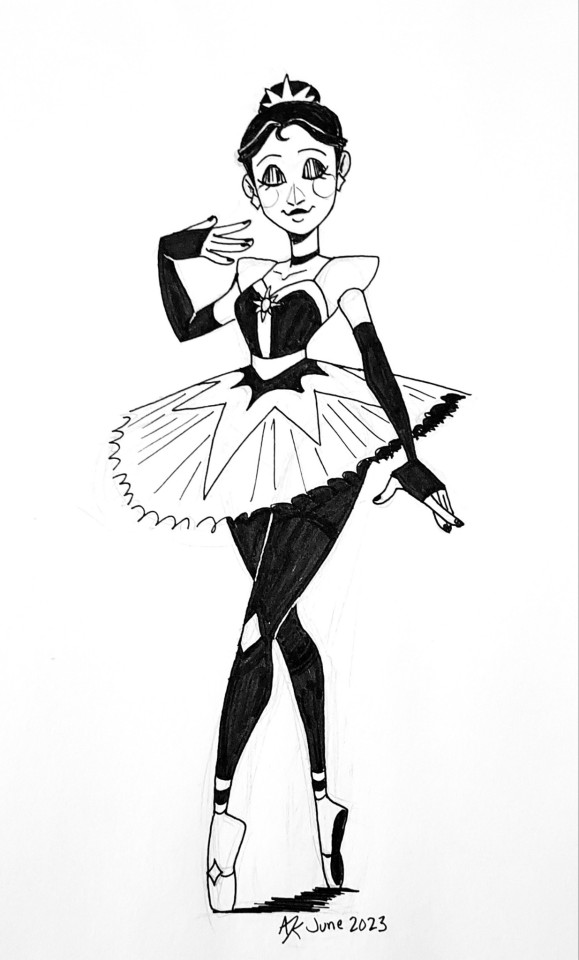
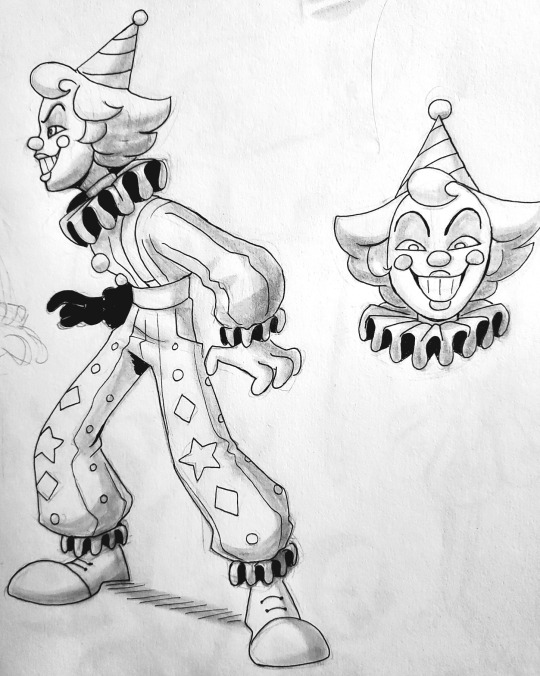
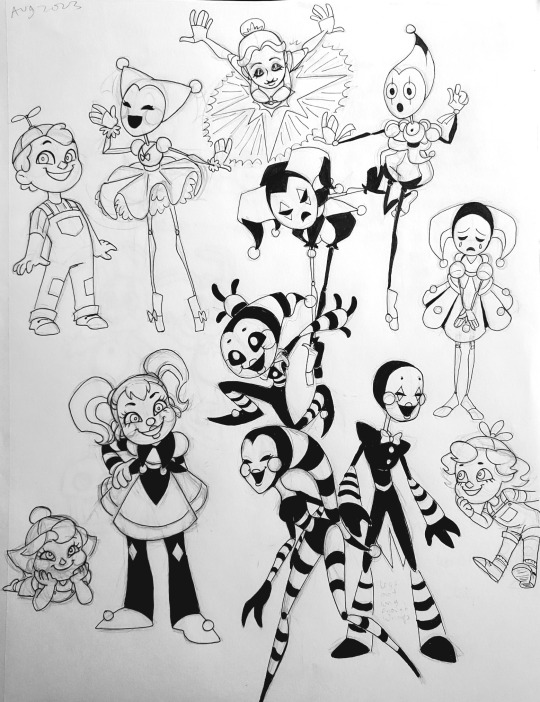

This is the last of my fnaf backlog stuff for now. I'd need to scour some older sketchbooks for more. Although I've been messing with colors, so that might be something I could share.
So I wanted to try my hand at redesigning some fnaf characters. I just didn't like how hideous they were for something that should be designed to be endearing to kids.
Details under the read more to avoid clutter.
My mom saw me draw Ballora once(not knowing it's fnaf), and asked me to draw more for her. So these are a couple of the ones she requested. I'm not sure why she was so fixated on multiple ballerina pictures. Anyway, I didn't like how...scantily clad... Ballora looked. So I gave her a more family friendly outfit.
I don't quite like the lore surrounding Ennard, so I just gave him his own design, rather than be an amalgamation of other animatronics. Molten Freddy/the Blob/Tangle can fill that role without Ennard. I've been workshopping an idea where each member of the Afton family has an animatronic that is meant to replace them in some twisted fantasy William concocted, via some type of soul stealing/remnant/haunting situation. Ennard is basically hunting for Mike specifically.
The puppet was a hard one to pin down. I liked multiple different design option. Until I just went with multiple. There's the Marionette, the Mannequin, and Poppet. All variations of the puppet. They gave me pierrot clown vibes, due to the black/white color scheme.
Ballora has four minireenas, each themed after an emotion. Joy, Gloom, Fury, and Awe. I figured it would give them more personality than they have in-game.
I've changed Circus Baby's name to Circee, because I don't like her canon name. She also seemed underdressed, so I gave her a more harlequin inspired look. I repurposed Balloon Boy, DD, and JJ to be her bidy babs for the sake of streamlining. It's a more efficient use of resources. I figured it was only fair that they all got actual names too.
Trying to keep marketing in mind, I figured it would make sense for BB to be "the boy", DD to be "the girl", and didn't want JJ to upset that balance and left JJ ambiguous. Not necessarily even nonbinary. Just whatever gender any individual deems fit. Poppet is actually the same way. They're just robots. FazEnt isn't committing to anything.
#fnaf#five nights at freddy's#fnaf redesign#ballora#ennard#minireena#circus baby#circee#bidybab#balloon boy#fnaf dd#fnaf jj#balloon boy billy#darling dolly#jolly jackie#security puppet#fnaf marionette#fnaf puppet#fanart#a3 art#traditional art#sketch
289 notes
·
View notes
Text
In defense of Andrew Graves: Facing Yourself
Alt title: Andrew Graves: The Will to Plow Her
I think my analysis of Andrew is one of the best essays I've written so far. But since then, I think I've expanded my understanding of his character in a way that urges me to add on to my prior essay. What I intend on doing is further fleshing out my reading of Burial, and going deeper in detail on why I think Decay ends up panning out the way it does. This essay will end up sharing a lot of text with my prior one, but will add enough scattered throughout that I think it merits a complete reread instead of just scrolling down and seeing what's new.
I've focused a lot on Ashley in my past writings. She's my favorite character in the story (and depending on how episode 3 pans out, maybe ever) and I'm pretty mortified by how some parts of the fandom have reacted towards her, so I pretty much made it my life's mission to push back against that. From highlighting the ways Andrew mistreats her, to coming up with justifications for her behavior that aren't just being a manipulative bitch, I really wanted to prove that a more favorable picture of her could be painted than most were willing to.
But in doing so, I've left Andrew in the dust.
In highlighting his flaws and the ways he mistreats Ashley, I think I've implied a level of intentionality to his actions that I don't believe he has. When I say that Ashley did nothing wrong, it's in direct response to the idea that she holds the most responsibility and agency in how their dynamic plays out, when in reality, I believe she has very little. Most of her actions in-story are in reaction to a variety of stimuli that come directly from Andrew, that he has control over and are aware of how Ashley feels about. His refusal to use clear and direct language to deny her most toxic tendencies causes her more and more stress as time goes on, and instead of giving her clear answers he opts to be catty, passive-aggressive, or, at his worst, threatening. Never direct and never clear, except when establishing boundaries over his name after the choking scene. Andrew fails to help Ashley be better in some frankly depressing ways throughout the whole story, especially in their childhoods, so we never get to see where she'd fall short if given a better influence.
...
Kind of. More on that later!
In mentioning his thing about preferring to be called Andrew instead of Andy, I also implicitly mention one of the places where Ashley falls short in their dynamic and could stand to do better: recognition.
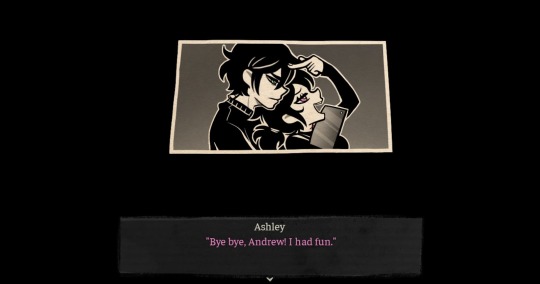
This scene says a lot. It's the most heartbreaking scene in the game, if you ask me, and probably the single most profound and well-written moment in the entire story. I could write a whole 2000 word essay on it alone, but I've already said most of what I have to say about it through what I've said in other essays, so I'll spare you all that. Instead, I'll use it to highlight something:
"I had fun."
Their dysfunction is fun to her. She's so used to abuse and alienation that even the most awful, stressful (as far as we know) route of the game is still fun to her. And that's not a sign of her being a secret evil sociopath or whatever; that's actually not abnormal behavior to develop for a lifelong victim of abuse. Those highs and lows, those strong emotional highs and lows are -addicting-. They're -fun.- Part of why abuse victims get into so many abusive relationships is because it's easy to pick up on those patterns of thought and take advantage of them, and the cycle of abuse is often furthered when a victim of abuse tries to draw out mutually abusive behaviors in someone with no interest in having that kind of dynamic.
This is where I'm willing to acknowledge Ashley's manipulative tendencies. Not just as a matter of controlling Andrew for its own sake, purely out of jealousy or possessiveness, but as a matter of trying to further the only dynamic she's ever known in her life. Better the devil you know, right?
That push and pull- that emotional rollercoaster- is all many of us know. And it's all Ashley knows. This dynamic is something she's so used to that she reacts incredibly harshly to any attempt to change it, because she doesn't know that things can be better. Because of this, she refuses to engage with who Andrew really is, and tells herself- and him- that she *hates* Andrew:
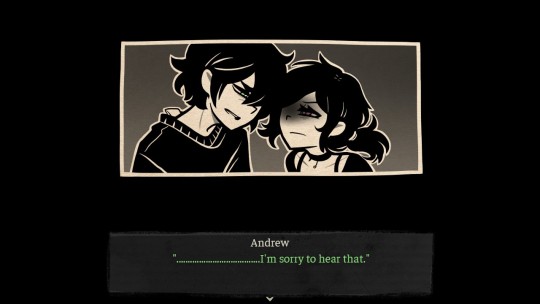
This scene is almost as heartbreaking as the above one in a lot of ways.
Andrew putting his foot down about the Andy/Andrew name dichotomy wasn't arbitrary and it wasn't just about his comfort. It was about Andrew giving a clear indication about what needs to happen for their relationship to improve. He's recognizing the cycle between them and wants to put a stop to it, because he's confident that things between them CAN get better and evolve into something healthier. Ashley, not understanding that their dynamic can get better, because their "fun" little push and pull of abuse is all she knows, rejects that. She rejects the unknown, and says- in Andrew's mind at least- that she'll never accept that new dynamic, nor will she accept who he really is.
Ouch. No wonder he looks so sad in that screenshot.
They have a conflict of understanding here, and I think it's fair to pin most of the responsibility on Ashley. Andrew was clear in what he wanted, and Ashley just... Didn't. She didn't see the importance of it ("...whatever that means in practice") and didn't really ask. This gap in communication, perfectly displayed in this scene, is likely what causes the Decay ending. He wants things to be better, and wants to treat Ashley better, and whether or not he understands the ways in which she communicates with him is in part what determines what he sees her as.
But there's a lot of evidence that he always wanted things to be better, that he always wanted to treat her better. But external factors have made it very, very difficult, and I think there are two key points in which he started to shed the importance of those external factors and seek that better relationship, both of which happening in the apartment: The killing of the warden and the 302 lady. In the first case, he was forced to do it to protect Ashley in a way he hadn't done before, or depending on how you look at it, since the death of Nina. But the intentionality was the key point here. After this point, he calls Ashley Leyley, which may or may not seem important at this point, but it's something I'll draw attention to later, so keep that in mind.
Next is the killing of the 302 lady, which is the much, much bigger point. We don't learn much about it until later on- as at first he just gives an excuse about the nail gun that doesn't line up with what we see on the map- but during the dream, it's revealed it was a calculated, intentional killing that he did to make sure there was no evidence left behind, and because Ashley (supposedly) would've wanted him to do it anyway. I say supposedly because Ashley herself doesn't seem to ever want Andrew to kill for her past Nina's death, because he only ever kills for her to defend one or both of them. If you want more evidence that violence for violence's sake isn't something she wants, look at this part in the final dream:
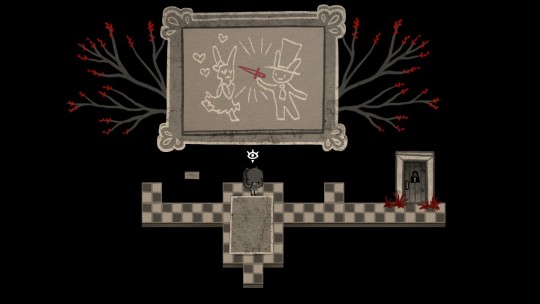
A knife isn't what opens the door, despite it being placed on the ground in that very map. While it seems obvious that the knife (violence) would be the key to solving the puzzle, it's put there explicitly to show you that it isn't. It's not what she wants; what she wants is a flower.
So, why is this important? Why am I centering Ashley- again- when this essay is supposed to be about Andrew?
It's because these two killings are when Andrew's self-delusion over who he really is starts to break down. It's still there, mind, as he still relies upon Ashley as an excuse to justify it, but, as well as what I've said before, the name ultimatum is an implicit confession that the normalcy he finds comfort in is starting to lose its grasp on him. There's a lot that's been said about Andy being something close to a "moral impulse" for Andrew, given his child self's reaction to Nina's death being the only thing he does that approximates a normal moral response to his and Ashley's actions, but if you do think that- which I think is a reasonable thing to think even if I don't necessarily agree- there's something you must also keep in mind:
-He- is the one who doesn't want to be called that anymore. -He- is the one who wants to let that moral impulse go, and Ashley is the one making it difficult.
That reading is assuming that Andy is a moral impulse, which I think is... either wrong or too simplistic. Every time I see that reading, it's from someone who's trying to paint him too sympathetically and absolve him of most moral responsibility. I also find it infantilizing to equate morality with childhood in such a way? But that's another tangent that I didn't sign up to talk about. What I do think, however, is that it's a useful framing device to display his own relationship with morality; the allegory to his child self doesn't have to be there for the general pattern to exist.
When Ashley starts to grill Andrew over the killing of the 302 lady, he gets mad. Very mad. Ashley sees it as pointless, as him covering his own ass, but he genuinely did it for her sake, because he thought that's what she wanted, and that it'd make her happy. But what makes her happy isn't violence- or any similarly extreme action for that matter- it's attention and validation. Something he's always reluctant to give her, despite the fact that he always chose her over the alternatives. But despite making that choice, it's always empty and meaningless, because in Ashley's mind, he never did it for her sake.
And hoo boy, does he not like it being framed like this.
He is perfectly willing to do whatever it takes to keep them happy and safe... but only for her sake. It has to be for her sake. He still needs that traditional role, and he still needs to have a narrative in which he's the good guy- a protector. Because it can't be for his sake. It can't be because that's what he wants. He has to uphold that romantic (in the literary tradition sense) ideal. His darkly romantic idealistic streak colors many of his actions and beliefs. This is most plainly visible in his quip about a double suicide being romantic, but it's also visible within the symbolism present within his dream, such as how he can only pave his own path in blood unless Ashley lights the way. It's visible within his appreciation for poetry, and it's visible with how the cultist within the dream speaks in Shakespearean English.
But the transient nature of this ideal is also revealed within this dream, because there's never a cohesive, guided path, even with Ashley there to light it up. Contrary to Ashley's dream, where you literally have maps showing you where to go, Andrew's dream has many more dead ends and no map to guide him. The symbolic role he acts out gives him no clarity, and there's no overarching narrative; merely a bunch of disconnected symbols.
This is contrasted with Ashley's dream, which has narratives so clear that the story literally gives the dream an episode title.
In a sense, he wants to view himself as an actor acting out a role in a story. He wants his life to be poetic, to represent something greater, and to have a cohesive narrative. This is why he's so disconnected from his true desires: He's more concerned with acting as a representative of an ideal than a person with agency. But every time the mask drops, every time he stops acting, his true self becomes visible. He naturally settles into being comfortable around Ashley, in treating her with warmth and kindness, and their banter becomes much less toxic. As intent as he is on acting out his role, it does nothing for him, and as his dream sequence shows, it doesn't even form a cohesive narrative, because he can't act one out. It's too contrary to who he really is, and what he really wants. But that idealization doesn't just apply to himself, it also applies to Ashley. Specifically, who Ashley is, vs who he wants her to be.
In his unique dream sequence, he sees two versions of Ashley; the child version of her- Leyley- and the adult version of her- Ashley. And the differences in the ways he interacts with the two of them are stunning. Leyley is an obstinate, annoying child. She's the one he NEEDS to take care of, and he hates that. He hates Leyley for what she did for his childhood. He hates that he needs to provide for her. He has the option of trying to kill her, even, over something as small as a candle!
But in the room with all the murders, the gilded cage, he sees Ashley as an adult. This version of Ashley is stuck in a closet that he himself has to open- and to choose to see. Their interactions are calm and friendly. She teases him a bit, sure, but she's still helpful, and they have fun together. He doesn't need her, and she doesn't need him. He needed Leyley- needed the candle- but here, there are other limbs strewn about for him to take. And, crucially, he doesn't even have the option to kill this Ashley for one of the limbs.
And during the choking scene, he lets her go the moment she acknowledges that he doesn't need her anymore. This is the first time we know of that he seems comfortable enough to set a clear boundary, which is acknowledging that their prior dynamic is dead and that they're now Andrew and Ashley, not Andy and Leyley. It's a bit late to express a clear boundary -after- literally acting like he was going to kill someone, but it's the first time we know of that he sets a clear standard for what, in his mind, would improve his relationship with Ashley.
After all, what he wants is to want her, not need her. He wants Ashley for Ashley's sake. Not for what she can provide him. He doesn't even need her for sleep, he just wants her. But Ashley has trouble acknowledging this, because he's never before shown that WANT. Only a NEED. She keeps trying to find ways to make him need her, because she's never seen what his desire for her is really like. She's only ever seen him desiring someone else, someone other than her.
She's only ever seen him as Andy, because she's never truly seen Andrew, only the violence he can inflict on others. But Andrew can see both:
He can see Leyley, the needy, bratty child who always needs his attention, that he needs to provide for. The one he hates and wants to get rid of. The one he kills for to protect.
And he can see Ashley, the one who engages in friendly and cute banter with him. Who comforts and shows him physical affection. The one he loves. The one he kills for to make happy.
He just can't choose which one he wants to see. Every outside influence- from his parents, to Julia, to Nina- makes him see her as Leyley. Ashley herself makes him see her as Leyley too, whenever she brings up all the things he did for her, and calls him Andy, his child self, instead of Andrew, his current self. And as long as he sees that child, he feels like one too, and can never give Ashley anything that comes from the heart.
But he really, really wants to see Ashley as an adult. He wants to take pride in her, how much she's grown, and how driven and competent she really is.

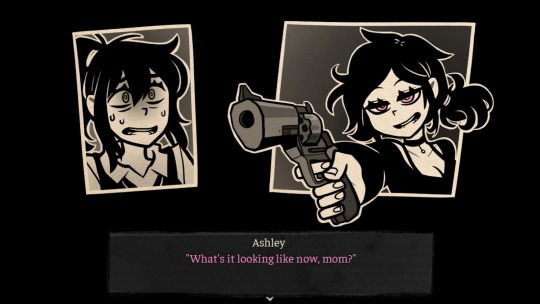
But god damn, does that bitch ever make it hard, because there IS no real difference between Ashley and Leyley. She's grown and changed over time, taking more adult (and stereotypically feminine) responsibility upon herself, but the fact that her temperament and personality hasn't changed much obfuscates that growth. When you talk to Ashley in the closet during the dream after getting the limb, Andrew asks Ashley to come out of the closet, but she refuses to come out because he won't invite Leyley over to play, which is a pretty strong metaphor for how he interfaces with different aspects of Ashley's personality and refuses to accept others. But the reality is that he needs to accept both, or rather, see her whole self as Ashley, rather than just the parts he likes.
In the end, it's him who has to make the choice how to see her. Ashley can only see what she's been shown, but Andrew can choose.
And in the basement scene, he makes that choice.
If Ashley refuses to leave him alone with their parents, that's it. In one of the most critical and important moments of his life, she couldn't give him the space needed to make up his own mind. She couldn't treat him as an adult. She couldn't see him as Andrew. If she does give him that choice, she chooses to acknowledge that Andrew is an adult who can be trusted to make his own decisions, even though she (perhaps foolishly) believes that this choice lines up with her own interests. And frankly it does either way, but in accepting their mom's offer, her chooses to see her as Leyley once and for all. He chooses not to reciprocate what Ashley showed him. He does it because he needs to, not because he wants to. Because it's his duty, not his desire.
This is what results in the Decay ending. Through his inability to see Ashley as an adult, he surrenders his agency and views all of his actions as an extension of his responsibilities, his role, which he no longer wishes to uphold. He dissociates fully from who he really is, acting in accordance with that disconnected, barely-cohesive narrative that exists only within his mind. The game starts to resemble the heartwrenching tragedy that many seem to take for granted that it is, as their dynamic fully doubles down on its painful toxicity. And, in an example of a poetic book end, Ashley's dream shows a double suicide, closing the book on their tragic tale.
It's tragic. It's heartwrenching. It's poetic. It's beautiful.
...Except it's not. Not at all.
It's actually fucking stupid, pointless, and brutal, and Burial shows us that. When we view their spiral as beautiful, we project the same darkly romantic ideal that Andrew possesses onto the story.
But the actual reality is horrifying.
Ashley spends most of Decay terrified of Andrew, the one person she found comfort in. He acts cold, distant, and aggressive towards her, showing pointless cruelty instead of any warmth. All she wants is comfort; all she wants is to not die. She doesn't want to engage in this death spiral at all, and, in her dream sequence, shows none of the same willingness to die alongside Andrew that Andrew does with her. The moment we stop focusing on the end of the Decay dream sequence, which has very striking imagery, and if you choose not to shoot, one of the most beautiful scenes in the game, we can see it for what it really is:
A scared animal running away from a predator.
The moment you see Decay through Ashley's eyes, and not the perspective of some romantic ideal, Decay becomes terrifying, tense, and painful. There is no catharsis to be had in this tragedy. It's easily avoidable as long as Andrew chooses to engage with reality, and not the empty promises of his mother and incoherent narrative of his ideal.
Finding beauty and meaning in tragedy is how we cope with the harshness of reality. But there is no coherent narrative to the tragedies we experience, just like there's no coherent narrative to the ideal Andrew wishes to uphold. It's something we create- that he creates- but it's not something that actually exists.
And when Andrew casts aside his desire for that ideal, and the responsibilities it shackles him to, it grants him clarity that he never had before. He sees the world for how it really is, and acknowledges that nobody- the least of which their mother- is as different from Ashley as they pretend to be.
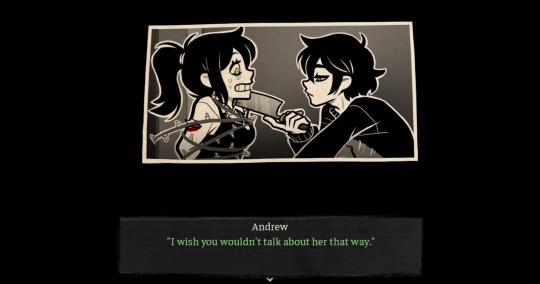
They're no better than her, and he's tired of people pretending that they are. People are all the same, no matter what ideals they try to uphold and represent. They still sacrifice others in the name of advancing themselves, still punch down whenever they can, and still lay blame on those beneath them rather than try to take control of their lives. They just use those ideals to justify themselves, but Ashley, and now Andrew, reject even the need for that justification.
This is why I believe the story is nihilistic. Not in that it asserts the inherent meaninglessness of life, but in that it grapples with the ideals we uphold and how they obfuscate the reality of the world we live in. The story, intentionally or not, highlights how ideals are often but a pretense we use to justify what we were likely going to do regardless, and how holding to them too strongly can lead to our ruin- and how monstrous they make us look to those who do not share them.
Consequently, this is how I view the part of the fanbase who thinks Decay is a good ending.
(the characters themselves represent existentialism rather than nihilism but i couldn't really fit that analysis in here without it feeling forced so i might cover that another time)
From that point on, their relationship becomes a lot more friendly, lighthearted, and playful. They ironically start acting more like children, but to quote CS Lewis:
"Critics who treat adult as a term of approval, instead of as a merely descriptive term, cannot be adult themselves. To be concerned about being grown up, to admire the grown up because it is grown up, to blush at the suspicion of being childish; these things are the marks of childhood and adolescence."
He's not ashamed of being playful with Ashley, or showing affection towards her. He's grown up. He finally sees her, and himself, as an adult- although he still doesn't show that in full until much later on (more or that later). But in Decay, he still sees her as a child, and to an extent, probably himself. Let's compare the ways in which he reacts to being called Andy. In Decay, he lashes out at Ashley and gets angry, even threatening her. But in Questionable Burial, he calmly says that Andy is dead and doesn't need Ashley's comfort, but still tries to reassure her that she's still needed. He's not ashamed of or hostile towards their prior dynamic, because he's grown past it. He still acknowledges Ashley's need to feel needed, but here, he recognizes its importance to her, whereas he was hostile towards it before.
It's a display of respect towards her feelings.
This interaction doesn't happen in the Sane ending, however. He doesn't play games with her and is just a lot less fun to be around all together. Why is that? Because he still hasn't yet shaken viewing Ashley as Leyley there. He still views her as a burden, as someone who needs taking care of. He's calmly accepted that, too, mind you, but he lacks respect for her because she's still a child, in his mind. But in Questionable?
The vision did more than just make him extremely embarrassed and lay his deepest desires bare. It forced him to recognize Ashley as an adult. When choosing between "Never" and "Never say never," if Never is chosen, the burden of thought is lifted off of him. But if Ashley chooses "Never say never!", he has to reckon with the fact that Ashley is an adult, someone who can consent to those kinds of things. Someone who MIGHT. Someone who has agency, and can make her own decisions. And more importantly… someone who can trust him to make his own.
Whether he desires sex or not is secondary; he's always had those feelings and has always been ashamed of them. But now that the part of him where that shame came from is dead and buried, there's no childish impulse to grow up. There's no attachment to the hate and bitterness he had before. Look at what he worries about when he picks up that she's uncertain or confused about who he is now:
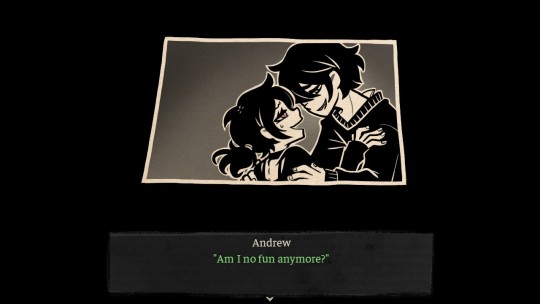
It's her feelings.
He wants to be fun to be around. He wants to make Ashley happy. He loves her, and not as a romantic interest or even as a sibling. He loves her independent of all that baggage.
He loves her as a person.
Their relationship runs contrary to societal ideals in some pretty huge ways. So contrary, in fact, that it's hard for some to accept it as anything good, that it can ever be best for the people involved. It's incestuous. It involves them killing and eating their parents. It involves them distancing themselves so much from society that it's hard to believe they'll ever fit in it again. It's chaotic, it's messy, it's codependent, and maybe even toxic. And yet, here they are. They're coexisting. They're happy. They're healing. They're navigating the world in the only way they can: together.
Meanwhile, in Decay, Andrew refuses to allow himself to get closer to Ashley. He surrenders all agency to her, buys into his own narrative, drinks his own Kool-Aid, and may or may not condemn one or both of them to death in the process. Like it or not, the only path where Andrew takes ownership of his life is the one where he's closest to his sister. It's the one where he decides where they will go next, the one where he decides his own feelings matter, and acts in accordance with what he wants instead of how he thinks he should act.
His agency, his freedom, and his growth don't happen in spite of his codependency; they're happen because of it. They can't grow alone. They can't heal alone.
In reading the story, one must interrogate how important those societal ideals are in the face of the realities of what makes people happy. Are those ideals worth upholding in spite of this? Can we really allow people to fall through the cracks in the name of social norms? Can we blame people for taking rash actions when the social contract has failed them?
Or are we so blinded by those ideals that we can't see that people can be happy while blatantly disregarding them?
All I know is that in Burial, Andrew, having cast aside normalcy, now appears to be truly happy for the first time in his life.
Who are we to take that from him?
199 notes
·
View notes
Text
Hi, I really like making little personalized references for characters I like when I get into things! I do this to figure out how I wanna draw them, and is a recent-ish development that I haven’t done a lot, but I really like character design and thinking about them! So I made some for Siffrin. How fun!
DO NOTE THAT THIS WILL CONTAIN SPOILERS FOR LATER PARTS OF THE GAME. I did obviously tag it as such for the sake of others and it will be further down, but I figured I’d still warn you just in case. <:3
Now, without further ado, here’s “reference one!”
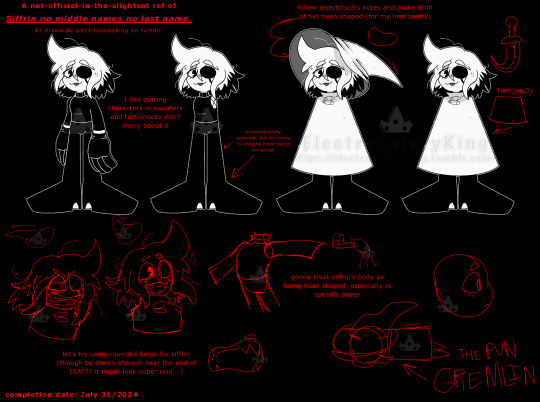
I’m personally gonna be using this in conjunction with Siffrin’s actual reference sheet (which I refer to as “notes” in mine!!) to make sure he look his best! I also wanted to make sure they’re “in line with canon,” yet still in my style and in a way I can be proud of.
Which isn’t that hard, since I’m usually always proud of my own work. I just like my own stuff. <:3
Due to the brim of his hat allegedly being bean-shaped (teehee), I thought it’d be fun if I carried that over to his torso/body. It’s not noticeable with a cloak in the way, nor when Siffrin’s standing straight up. Basically, the bean shape would only be revealed in certain poses.
(Coming up with that also made me say “Whoops! All beans!” out loud about Siffrin, btw.)
Additionally, I like giving characters is their own set of fangs. One character I draw has a gap between them and the rest of their teeth, one has prominent ones to make them more cat like on purpose — and for Siffrin, I decided to give them rounded ones.
I usually make fangs razor sharp, because I really like big ol chompers like that, so them being round is definitely a very unique thing for Siffrin to have. Well, at least at first.
I’m also a really big fan of certain design elements sticking around after something wild happens to characters… which brings us to “reference two.”
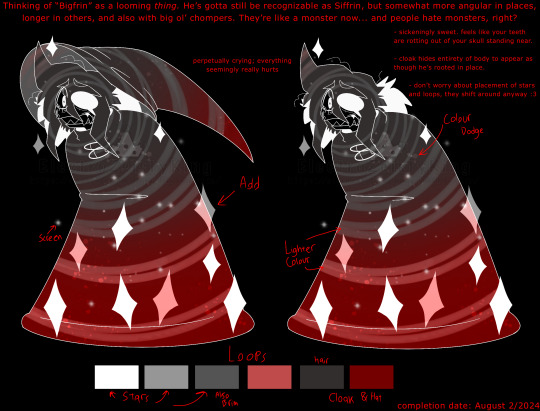
Well, if you’re not gonna be able to find any good references for this version of Siffrin, you might as well make your own, right??
The major thing I wanted to do with this Siffrin was to have him still feel like himself, but also give him somewhat of a unique design in comparison — by playing up elements I noticed during this scene.
Making this Siffrin feel as giant as they are was important to me. I went ahead and made their hat, face, hair and cloak longer. Made their shoulders broader, had them hunch over so they’d practically loom over everyone. Trying to appear smaller while still being an obstacle. Wanting everyone to stay here. Wanting their family.
I noticed that a lot of Siffrin’s hair seemed a lot more angular here, so I felt it crucial to use those shapes, but going a couple steps further and using them for his face as well… primarily his mouth and chin, of course. Which meant replacing those rounded fangs I gave him with a full set of sharper ones.
(I also wanted them to look like they’re too big for Siffrin’s mouth, so two of them — well, four? — will always peek out/fall past their lower lip. It’s like their teeth are not a comfortable fit whatsoever and it makes talking feel weird, but they manage.)
(They stick around after Siffrin “reverts back” or whatever we’re calling it. He never gets his round fangs back, but at least the ones he has now serve as a reminder that he got to the end. Might take some getting used to, though.)
(I also tried making their brows look a bit more angular? Can’t tell if they really come across that way.)
ANYWAY, I THINK I SHOULD STOP HAHAHA. I could go on and on all day, but I got other things to do and I think I’ve already explained enough! Just know that I get a kick out of putting love and care into character thoughts and designs. <:3
#in stars and time#in stars and time fanart#in stars and time spoilers#in stars and time siffrin#isat#isat fanart#isat siffrin#isat spoilers#siffrin#zeisty’s in betweens#character thoughts#headcanons maybe??#i was gonna make a jab at how siffrin looks like a sonic the hedgehog character in that first ref#but coming from the guy whose first two contributions to isat was siffrin in sonic adventure poses#and who is also a sonic fan working on a particular fancomic#i think that would’ve been too ironic. or self aware? idk. just felt outta place#either way yeah. i draw really big hands and stompers and i think it’s due to me being a fan of sonic the hedgehog#also yeah! this is mainly for me but if anyone else wants to use these (especially that last ref bc I know there isn’t a canon one)#absolutely feel free! heck even let me know when you do! i think that’d be fun!#i think siffrin would make at least one pun involving the new sharper fangs. maybe even more than that
94 notes
·
View notes
Text
Well... after spending most of my day languidly sighing about having to wait for more content but how much that content is gonna hurt, I did my rewatch with a friend and we spent about an hour pouring over every detail of it and how good it was, as well as our apprehension about the pacing of combining other content into movies. As much as we'd love to see a return to a 60 episode anime arc for the sake of momentum, we come to Ufotable expecting quality, and they wouldn't decide to do this unless they had a plan for how to make it quality. Try though I might to guess how and where they'll split this into three movies, it's all guesswork (heck, maybe they'll even switch the order of things around so that Douma's defeat comes before Akaza's for the sake of a more complete-feeling movie.
But the thing that makes me most sad about the announcement, now that it is official and not just a rumor, is that I don't know how long I have to wait.
And what will I get at the end of this wait? The death I fear watching the most, and they're gonna make me go through that in the theater, and not even at the end of the movie. That's gonna be almost right at the start.
Phew. Anyway. We really did gush and gush and gush and gush about everything that was so good in this episode, and it's because of this that I trust Ufotable (mostly). There is SO MUCH to gush about it, and it doesn't just come down to the slow-mo explosion and use of color to show how healthy Muzan is in comparison to Kagaya and the layering and timing of images and sound, but also just what the editorial decisions did to take Gotouge's characterization and make it unmistakable.
It's such a good reminder than what has kept me so deeply in this is the characters themselves, the layers going on between what we're given. Like, Kagaya only being able to trust Himejima with this mission, knowing there is a possibility Himejima will have to hold his own against Muzan, for who knows how long, and how is touched by Kagaya's faith in him, and how the unsurprising realization settles that this will indeed be a fight until sunrise, and the relief as well as the pride he feels when the other Hashira assemble so quickly, and the way his voice cracks when he announces who they are looking at? And nobody else made that connection except for Tanjiro, for their thoughts were so wrapped up in either holding out some desperate hope that their master might respond to them calling out his name like Mitsuri and Iguro, or like Sanemi consumed with the thought this demon, whoever he is, killed their master, for again, only Tanjiro who smelled the explosives seems to realize right away that this was on purpose? And the fact that Kagaya thought through every one of those five Hashira, and decided one by one that he couldn't tell them his plan? Even Shinobu, who herself has the very same plan and has discussed it with Kagaya, cannot be entrusted with the knowledge that he plans to use himself as bait. And that Kagaya, for every word he said, he was very consciously stretching that out, second by second, knowing that any extra innocuous thing he can get Muzan to listen to, whether it be prattling about tigers and dragons or asking Amane what he looks like, is going to save his children precious seconds of having to keep an onslaught going until sunrise. The little touches of characterization, like drawing us in to wonder if Zenitsu is sleeping and then revealing that no, indeed he is not, and the fact that Nichika and Hinaki had to choose to go outside, to a courtyard where a stranger was already standing, to start playing and do their best to play up their innocence for the sake of adding seconds more of distraction, and the way Kagaya turns toward Amane in the very last second, and Giyuu looking for Tanjiro as they fall, and despite everyone else stuck in free fall or smacking into things, Tanjiro, the only one who has seen Muzan before, is the only one to find his footing, is such a good main character moment.
And the "people's feelings are inextinguishable" moment among candlelit graves? Thank you. I had been thinking about those graves ever since we didn't see them in any of Muzan's strut through the previous episode.
Okay, speaking of linking images with sounds and lines, the fact that Kagaya brings up how Muzan hasn't been forgiven for ruthlessly taking away others' lives, and how it focuses especially on Hinaki and Nichika, whom Kagaya has already chosen to do the same to? And the hot linger of slaughters innocents represented by all those toy balls? AND HOW EVERY MOMENT MADE US MANGA READERS FLINCH AND THINK "NOW IT BLOWS UP"? Yeah, that was good.
Also, Japanese Netflix did not include the Taisho Secret. I don't know if this extra-secret Taisho Secret was only available on FujiTV or something, but when it comes to the mood this episode set me into, I'm glad I didn't initially see it. While I'm generally happy it exists (and I've been hoping for this kind of content ever since the previous season), I wish they would have had a little more restraint to make it sweeter. But hey, it was still sweet and I bought a sweet potato today for obvious reasons.
61 notes
·
View notes
Note
(waves) hello it me. SO. Do you have a reference sheet for your little guys? And. I love your soft colouring so much?? It looks so blended and. Just. What brushes do you use?? I want to eat your art and your lineart and colours and art style.
First of all thank you! You’re very sweet. Secondly I’m gonna do my best to answer your questions coherently so bear with my rambles
For the magical girls what you see is sort of my own reference sheet. I tend to overthink my work, so I’ve been purposefully trying to keep the magical girl designs relaxed. I don’t do a lot of prep work. I draw the pose and then design the clothing on top. I usually have an idea going in, and I design around that idea. Then I’ll also have a bunch of references off to the side of both their canon costumes and other magical girl designs. This is all a long winded way of saying I don’t have reference sheets because I’m cutting character design corners for the sake of keeping this light but I can make some if people are interested.
It’s not glamorous but this is most of what the design process looks like.
Brushes okay let’s hope I can remember the details:
For lineart I’ve been using a default brush on Procreate called “Streaks” under calligraphy. This is what I use for my looser, relaxed pieces. For my more polished lineart pieces I use a brush from a pack that I bought, that for the life of me I can’t remember the artist (I’m sorry) but it’s called “Look at this!”


For coloring I use a range of brushes. Some are from the pack I mentioned earlier and some are from another pack that I got from the artist Liliyth on insta. From Procreate’s default brushes I also use Tinderbox, Spectra, Tamar, and Dry Ink (which I’ve edited a little). For the magical girl au I’ve been mainly using a brush from a pack I got from dianammarol on insta called “Drawing Brush - Opaque.”

48 notes
·
View notes